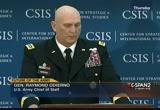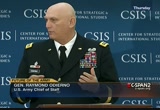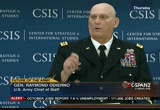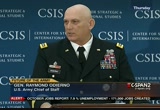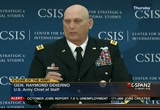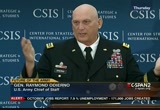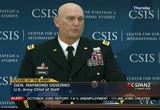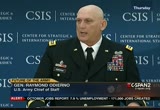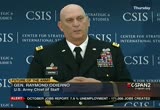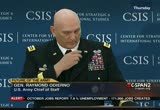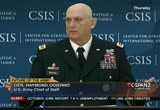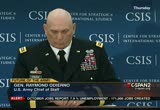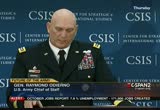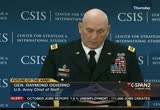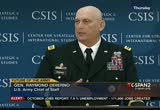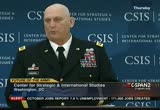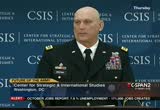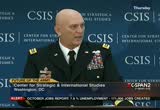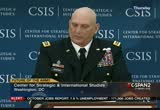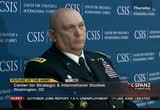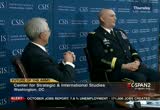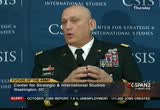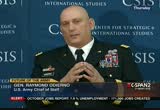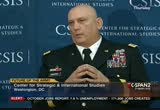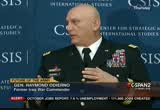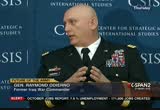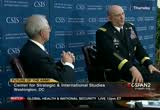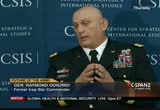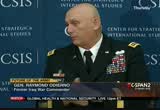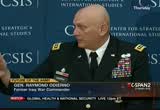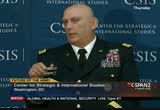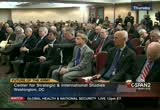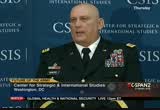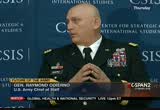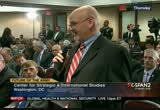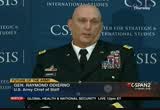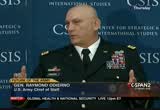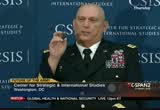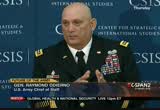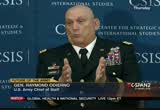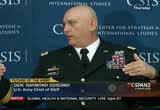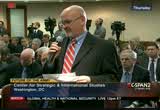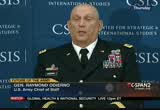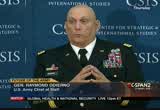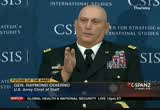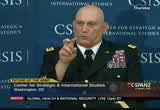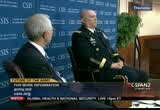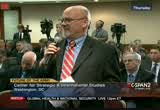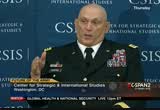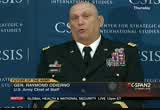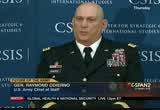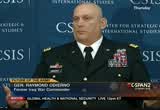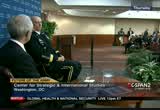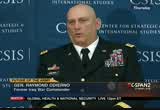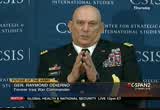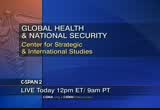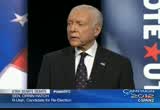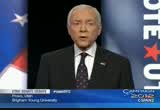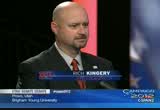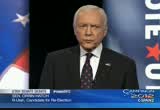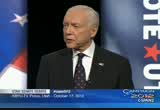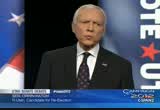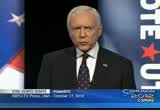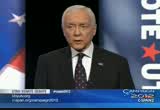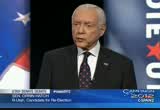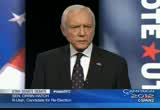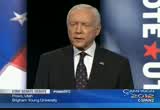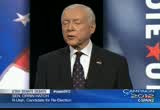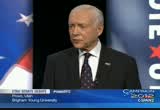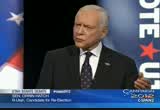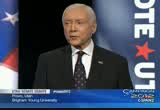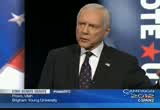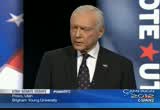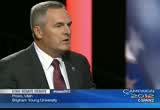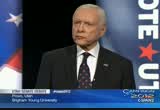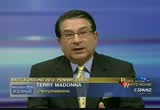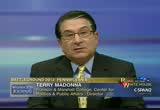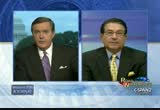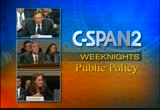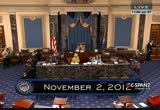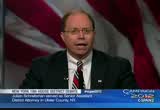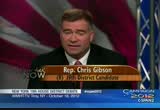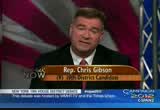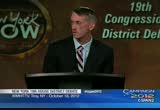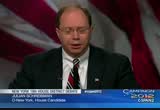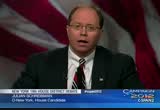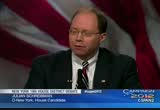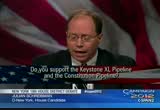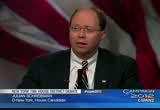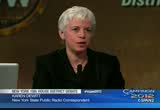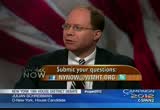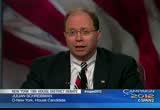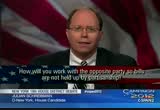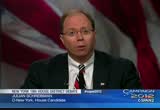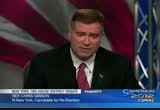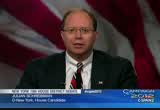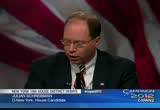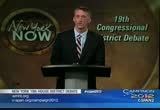tv U.S. Senate CSPAN November 2, 2012 9:00am-12:00pm EDT
9:00 am
across the globe in areas of 160 countries so that's where we start from. and as we now look to the future in as we look at a new defense strategy as we try to work through what the roles of the different services are, defense strategy, i also remind everybody that wall street will be downsizing during this time. the army, who at the beginning of calendar year 12 was popular will go down to 490,000 in the active component by the end of 17. we have significant deployed commitments. we are downsizing our army, and we are now looking to the future. one of the main things is granted make sure we have the right mix but i always talk about fashion executive arm and i really pay a lot of attention to. that's in strength, modernization and readiness. because in general terms those are the drivers of our budget. went to keep those imbalance.
9:01 am
we want to learn from the lessons of the future, past drawdowns. some of the lessons that you can't get out of balance, because you get out of balance you start have been unready army. which leads to a hostile army, and, of course, was talk about the army of the task force and its impact and is an preparedness as it was asked to go into korea post-world war ii. we don't want that to happen again. so the secretary of the army and i have been very clear that we are committed to make sure that we are ready. so no matter what size we ended, one dominant doctrine will be ready, we were to modernize and be prepared to do what information we have. and so we've got to make sure we keep that balance. we got to keep redoing the. we got to keep adjusting. we've got to make sure that we have a ready, capable force. tamika future missions. that's what we're focused on as we go forward as well. we've got to make sure the right mix it when i talk about mix, it's about light, heavy medium,
9:02 am
it's about active proponent, reserve component. it's about the right mix of civilian, military, and contractors. it's about the right mix between operational arm and institutional army. you have to get all of that right as you move forward, and you got to figure out what is that right mix. out of the quality you think you need to have as you go forward. so we have to learn from the past. but we also have to capture recent lessons, and then we have to see how do they apply to what we think the future operating environment with the. so with learning from the past, it's about applying the right lessons but it's about how does it apply to the future operating environment as we go forward. so we have to update several things. we just rolled out a brand-new doctrine. the first time the army has been an extensive rollout of doctrine in recent memory. we have published the additional high level documents of our doctrine. we will start to publish the sub elements of this over the next
9:03 am
six or eight months and represent some the lessons we've learned how we figure we'll apply to the future. and this is key as we start to look for the future as making sure we are based in what we believe is a way forward and we do that by riding doctrine. we have to look at operations, the type of operations, what are the best way to train our forces for the future, what are more important thing is how do we develop leaders. we believe one of the most important things we have to do is adapt a related development programs. what i mean by this, this is about adapting programs from the time you start as a cadet or a cadet at west point all the way through the time you're a general officer. and how do we attack those in order to be able to understand and operate in a complex environment that we think we're going to have to do in the future. we have to implement new dod strategic guidance in which the army come in my mind plays a critical role. the army will and continue to be
9:04 am
and indispensable part of the joint force. and although we sometimes talk about army navy air force marine corps, it is about the joint force. it is about the synergy that is gained of all the services in order for us, nor to meet our nation's needs and the synergy and balance necessary to move forward and it limits the new strategy. one of the issues i have come when people do an evaluation of the army, look at brigade combat team, how many brigade combat team compounded when you for the future. that's important to that's fundamental to what we do. however, people tend to forget many other parts about the army that is so critical to us supporting the joint force. first, 75% of the operational forces special operations forces is army. can't forget about that. we are responsive camera to make sure we stay responsive to civil authorities and for the example we continue to make sure we have the right capability to respond
9:05 am
to wildfires, hurricane relief, and as you see what's going on today up in the northeast. we provide a broad range of essential services today to combat and commanders that includes intelligence, surveillance, reconnaissance for all the geographic combatant commanders. we provide air and missile defense to all geographical combatant commanders to we provide logistical support to all geographical combatant commanders. we provide signal communications port to all geographical combatant commanders. these are critical missions that people tend not to think about. so it's important that you understand this. we provide key rotary wing for aviation can we provide information, civil is affairs, military police, debbie m.d. defense capabilities. corps of engineers who are pretty busy today, and doing many other things. we have critical components of
9:06 am
the military space program. we are responsible or everything from a satellite on down to the ground station in providing communications based on space-based elements. a lot of people don't know the. that's the army's responsibility. as we look ahead, cider is one of the more important things that we have to remember as we go forward. as i look at cyber there's a couple of things to national level cyber in your operational attack cyber and how we develop this for the future, what does it mean for the future way of conflict. how do we integrate that. how do we protect our own networks, all of this will be critical as we go forward. and then went to put that against what i consider to be what is the operational and strategic environment that will have to operate. there's much discussion about this, and there should be, a lot of discussion about this but the one thing i do know is there's incredible uncertainty as we look to the future.
9:07 am
every monday, i have my intel people come in and me on hotspots. and we put a map up, and all i know is aye -- i can spend a whole afternoon talking about the different hotspots. what i do now is it covered the entire map of the world as we talk about hotspots. and potential areas of instability as i would call it. we have to figure out what are the drivers of instability that we face and how we going to meet and try to reduce those drivers of instability that impacts our national security, whether it be in the middle east which we read about everyday, whether it be syria, iran, pakistan, considering -- into network and afghanistan, the fault lines in the middle east. weatherby out in the pacific with the rise of china. look at what's going on with the items within the pacific, korea, 29 euros leader in charge of korea, what is he going to do in
9:08 am
the future. we have narcoterrorism, we have transnational narcoterrorism. what does that mean for the future and so could ever country? i don't know. but these are questions we have to take a look at. these are questions that we have to be prepared to operating. the other thing i have learned come a frankly the hard way, over the last several years as my time in a back is that you also have what i call opportunists who will try to take advantage of instability and de- stabilizing influence, and mason governments are facing government. and these opportunists are may be unpredictable. and i was use iraq as an example. there were lots of opportunists and iraq. iran, turkey, saudi arabia, kuwait, nonstate actors all opportunists trying to get finish of a situation or how to set project itself around the world? what does it mean to us as we
9:09 am
look for the future conflicts? the character of conflict is changing by the operational environment conflict is change. but in my mind the fundamental nature of work remains the same. that's the struggle to influence populations in governance. that has not changed. so it's how we continue to understand that struggle within the new operational environment and context that we see it. the army has great 237 years ago to defend this nation comes to the interests of states abroad, and in my opinion that imperative has not changed. so as i got a force for the future, the one thing i tell everyone is that we're starting from a position of strength. and why do i say that? because of the army specifically with the most combat tested, combat ready, combat experienced force we have ever had. and what makes us different than when it came out of vietnam, for example, is this is an all
9:10 am
volunteer army. in vietnam it was not. a lot of that experience went back home. today, we're going to sustain and expand. we will sustain those leaders. so in my mind we start from a position of strength as we want to move to the future. because of the experience, capability that we now have. and it's important that we leverage that as we move forward. as i look ahead, there's a couple things i want to i want an army that is capable of many missions, at many speech, many sizes, under many different conditions. and the capability to operate in any environment. so i kind of put that as a start point as you look at what role will play and implement the new dod strategic guidance. and just the army will always be there to fight and win wars, but it's no longer an option. whether it is fiscal constraints of whether it's the way the world is changing around us, as
9:11 am
an arm and we have to be able to do much more. it's a central philosophy, in order for them to shape a complex and dynamic concerned world. conflict is ultimately a human endeavor, and the army strength is operating amongst its populations. and at the nexus of many domains, including cyber, it's very important for us to understand relationships between cyber and the human dimension and the land domain. and what does that mean for future conflicts. and i think sometimes in our conversations we don't really talk about that. and it's important for us to understand that as we go forward. i believe the army's unique strategic get those are crucial as we move forward. we have to be able to provide a flexible necks of tailored and skills capability, up armored meeting and light forced to grant provide strategic steps impressively to the joint force to craft a global responsible --
9:12 am
in 24 hours or less. we just recently completed a joint readiness, joint readiness training center for folks coming this week at the national training center we have established what we believe we might look at in the future. what does the future environment that are brigade, our divisions, our companies might face? it's a joint intergovernmental multinational environment. it has interagency participation to its environment one that might require some -- but also has a touch of terrorism criminality. opportunists. it's a complex battlefield that one minute might require some level combat operations in the next minute might require leaders to adapt and understand the socioeconomic conditions that they are operating in, and how do they integrate the inner agency multinational, multinational actors in a very small area. that's important for us.
9:13 am
so we are now turning towards the. we're adjusting it as we go for the end they will be important in informing us what is this type of many come would've the capability when you can what are the modernization programs we need as we go forward. we also in my mind provide something that the other services 10, but we've had recently streets and that is providing jdf capable headquarters. we have been able -- we are completely now over the last 10 or 12 years deployed gtf forced as% of jdf. what we want to do is build capabilities that allow us to a joint task force is capable of operating from the lowest level all the way up to core quality. enables us to support the combatant commanders and achieving the goals, shaping them on, whether it be in preventing conflict of whether executed conflict in some way. so it's an of import for us in that area. so there's some things we are
9:14 am
already doing. from up until this year, the army has been build and organize over the last five or six or seven years in order to respond to iraq and afghanistan. we with the process that is essential. to ensure our forces were ready to prepare and operate in iraq and offensive but we now need to look at how we want to translate that to the future. the first step is going to regionally online forces. so we will adjust this army force generation model in order to train and make available to combatant commanders regionally lined forces. that's all sides. it can be from platoon after brigade. it could be combat, combat support, combat service support. we are developing capabilities we get better at building partner capacity, conducting joint exercise, multinational exercises. we have a brigade, 162nd brigade which very few people know about in louisiana.
9:15 am
established over years ago to help us build, to build and train our teams that are training of iraqi and afghan forces that we're going to adjust that command once we get, as we start to come out of afghanistan to look worldwide and how would you building partner capacity. they will be our training, they will be are training center for making sure we are training individuals properly in order to be able to do this. those are some of the subtle adjustment we're making that will continue to move forward. this year, we are aligned the second brigade to africa. africom already has given 96 nations over the next 12 months to execute. from platoon level all the way up to a higher level of exercise. that's the needs better out there now and that's how we will continue to adjust as we go forward. i already talked about responsive packages. we are also looking at soft
9:16 am
conventional force interdependence. we are working very close with special operations command your continued to develop the relationships that we have had over the last 10 years and a craft -- in iraq and afghanistan. we're standing up a plan power. that would be the special operations command of the army and the marine corps to look at future conflicts, what does it mean to ground forces, what are the characteristics and capabilities that we want? so just an example, for example, just returned from afghanistan. they are now aligned with pacom. and, in fact, they're going to undergo a python sponsored certification exercise this year. they're engaging planning a war plan security operation bilateral and multilateral exercise. they will provide options for security force assistant and
9:17 am
humanitarian assistance, in the pacific command area of response. so these are just some of the things we are doing. i want to just quickly throw this out so you have an understanding of where we are beginning today. so when the and i think we're going from an army that was organized and trained over the last 10 years for iraq and afghanistan, one the go to regionally online forces and women future i believe will go to mission of tailored force. they will be tailored to specific missions in specific areas of the world but also have the ability to sustain a campaign quality if it is needed and on where it is. again, i want to reiterate our goal is will have an army that provides capabilities for many nations and many steeds, many sizes under many conditions, operating with the complex environments we'll be able to go. i want to thank again if i may just be. i look forward to your questions. i'll just say one thing in closing. but i do know is that the
9:18 am
nation's conflict as we go forward will continue to require presence in order to achieve decisive results. i reiterate that were will continue to be a human endeavor. you have to understand the human dimension of conflict, how it integrates with land, air and sea. and cyber. this will be essential to us as we implement future security strategies in this nation. so with that, i would end and i look forward to your questions. thank you very much. [applause] >> it's wonderful to have a professional with you should support when you need it. -- logistical support. [laughter] >> general, that was a very good and thorough tour of the challenges that you're facing. you look back over the last decade, and the army really has had remarkable achievement both at the individual level and that every unit level all the way
9:19 am
from squad on a. it's really been quite a remarkable run. in many areas in which, in fact, we never knew we're going to use our army to do, both missions and functions and operations. but some of that is not easily translatable into the world that we face today. and you hinted at how you would look at from organizing. the strategic guidance, of course you got there just in the nick of time to participate in the development, all the that took place. but it still and evolving dynamics. begins have and express led all the way, and the ways in these haven't been finalized yet and with rough challenge. how to wrestle with the question of translating the successes of that army into what will almost certainly be much fewer resources going forward? to talk about some of your downside. the indus not mr. inside, is
9:20 am
it's because we don't know. we are all waiting for the end. we will see what that turns out to be. but again, that goes back to one of my comments, as i look at the army, again, it's about that balance that i talked about of industry and and readiness and modernization but we can ever get out of balance. if we get out of balance, it will cost of potentially to be unready. it will cost to lose her overmatched capabilities we might have with our potential adversary. so it's important we keep that imbalance. no matter where we go forward. but the thing that i like to stress is, it is about developing leaders because ultimately -- what i talk about leaders, on talk about noncommissioned officers and authors alike. so for us because of the complexity of the army and how it's changing, we considered and everyone can have an opinion of what the climate will be like, nobody knows. nobody knows. we are trying to predict it. we're kind of make sure we're understanding the world, trying to make sure we are ready for that. it's going to take adaptable
9:21 am
leaders who can quickly understand, ss, understand environment that we had operating and how to use the resources and capabilities we have given them to be successful. so one of the things went to focus on is that. so as i look in what have to do is reinvest in our institutional army. because over the last 10 years, rightly so, we took the risk and institutional army to ensure we have enough people in order to execute two wars in iraq and afghanistan. we now have to go back and reinvest their institutional army which will help us to establish ourselves, thinking and understand these difficult problems, and how we want to adapt their to build compelling want to adapt organizations and how we want to adapt the military. what we don't want to do is rush into this. we have to take our time. went to continue to iterate. this is not a one time answer. when the budget comes out here and, you know, the 1370 budget, that's one shot. and we have the 1418, 15-19,
9:22 am
16-20. at all if it does chief of staff of the army. that's an intricate process and its building that army over time, understand the resources that are available. >> is true, as you describe the process its want of strength of the defense department if you will, the ability to have battled an iterative process but one that is fiscally disciplined and where it programs out for number of years for future so you a roadmap, map resources against it. we are a little bit out of practice in doing that, partly because we been busy doing of things. partly because with supplements and budget increases we haven't had to wrestle with some of us question. how do you reestablish that? >> one of the things, i remind, i tried them all our leaders that the last 10 years have been a resource rich environment. and i mean that because whenever
9:23 am
you involve anymore, our nation -- involved in work and our nation has been steadfast to make sure we have what we need. those might be different is how we are there, why we're there, our congress has life been made -- has only been good to make sure we have the money we need to do. as we all know that's no longer the case. first it's about putting the systems in place to understand and make sure that we're using every resource to its best capability. so let me take an example. so let me take training, for example. how we done training over the last five or six years in my mind doesn't at all replicate how we will do training in the future. because we were trying for very specific nation's. we were training for responsiveness to our mission in iraq, our mission in afghanistan. we now need to go back and start training using virtual constructive and life capabilities in order for army to do additionally some combined endeavor and in some additional
9:24 am
capabilities that allows them to be regionally capable. we don't know how much that's going to cost because we haven't done it in so long. and i think we've developed some systems along the line that allow us to do more missions. and so i have -- we're conducting some pilots right now at fort hood, texas, that will take a look at what this means. and it's comparing readiness. so it's not just about training being more efficient. it's about the result of the turn. is a just as effective quick so we are working our way through the looking at how we adjust our training centers and that we can make them more efficient and get more capable in developing our forces. so those are the kind things that go in the institution. and i talk about the doctrine. so this is a very complex move. so people ask me, you know, these are a lot of challenges and a lot of the face -- but i see as opportunities. we have an opportunity here to
9:25 am
really impact the future over the next four or five years. we have to. we have no choice. so we have to take advantage of that and see it as an opportunity and really tried to get our army, all our services will be in the right direction to prepare us to make sure we continue to be ready to meet our security needs by antony, that can be pretty exciting actually can actually. >> the challenge of face come in some ways can no longer be achieved in space begin mentioned to me for the flexibility and adaptability for not knowing what exactly going to do. this makes it a little hard to get how to size your force structure. for our lifetimes we have done it based on faith requirements are out there. operational plans during the cold war, wmds and the various iterations of that. how do you think of that flexibility and adaptability, anything that -- >> it is difficult.
9:26 am
i've been doing this for a lot of years. 10 years ago i was in charge of the army force structures ours involves. i have been involved off and on for a long time. to anyone of us, i can come up with a scenario that makes us build a 1 million man army or make us the 100,000 man army. same with the air force and navy. so in my mind, scenarios are a guide. in order for us, say, can we meet certain scenarios if they happen. but it's not having to buy capabilities to do not call -- at night and all the service after the. first want to have the right mix that allowed you to read and mixed calculations by our adversaries to it's about having that right balance, ground, air, sea, whatever we might consider that to be in order to deter eric and so, there's a size two it, there's a quality to it, and we have to make sure we have the right size and quality in order to deter conflict the what we have learned over the years is
9:27 am
that countries watch us very close that they watch what we have our weaknesses to they can to -- exploit those weaknesses to grab have a army, joint force that can shape the environment for combatant commanders. i think is one of the things this new strategy is driving us towards which is a good thing. in the past we really not had the opportunity to shape our environment, at least for the last 10 years because we've been so involved in iraq and afghanistan. so there's been forces after shaping but maybe not from the level we need to. so it's important when the stand that. so i think we have, what encourage them what encourages me as i watched and have seen how adaptive our forces been over the last 10 years, so i know we can be, i know we can do more than one thing at a time. i know where to organize ourselves and have the right training capability in place in order for us to take advantage and maximize the use of every organization that we have. to do several different, several
9:28 am
different nations but that doesn't mean everything has to be able to to every nation. it just means we have to prioritize and make sure that we organized ourselves in such a way that we have a broader variety of missions to mimic doing that way, sort of on the one hand, it doesn't drive a particular size of force structure but it tries to enter relationship, the elements. on the other hand, it also doesn't give you the basis for what you are -- every unit can do everything so how do you translate that into equipment requirements? >> i think there's a baseline. so the baseline is i believe that for our combat forces we have to, you have the capability to do combat -- excuse me, combined arms capability to that's the baseline and that's -- what are they need we need in order to move into the future. once you get to the baseline is where you can build income in my mind, a variety of capabilities
9:29 am
that meet regional needs. so you get to a baseline and then you've been unable to allocate or a fine forces in such a way that now gives them the opportunity to learn different core capabilities for specific command, africom, centcom, south, from whatever might might be. ectomy that's what is key to our future, understanding how we do that. >> you mentioned any for building partnership, some are successful practices. developed over the last decade. and institutionalizing those worldwide in effect, there's no place where that makes more sense than the pacific or have enormous opportunities for increasing engagement. those again are not big budget drivers, not big equipment card. not just how will others can work with us or how we can work with them. how do you tackle that, especially in an area like -- >> i think what we want, first it's about developing
9:30 am
relationships. and trust, and so initially we have to reinvigorate the army relationships in the pacific and we're doing that now. but because we've not been able to do it what we want to in the past, we have to refocus in this area to as i said i remind everybody, the pacific i know has a lot of water after in the pacific, but they are still landed centric governments to we have to engage. we had to be able to develop these relationships. read to be able to ensure that we can do multilateral events together to build confidence. in my mind that's the key piece in this. building confidence, and then escalate along with that you build the capabilities and we think are necessary for them to have in order to protect themselves and fit into the overall regional security strategy. >> when we took a look at that at csis we recommended actually
9:31 am
a four-star army position in the pacific, not because -- but because that's what -- [inaudible]. i've got a thousand questions myself but this is not just for me to ask questions. i hope you have been holding up your cards and it didn't been collected but if not, just hold them up now. stafa come to collect them and we'll get them up here. let me ask you one more while we're waiting for the cards to come forward. in times of tight budgets, there's a tendency to sort of circle the wagons to protect your core interests and not necessarily you want to collaborate. you mentioned both work with special operations command, and also as a landmark, and both the marine corps integration of other so can efforts to keep you will keep you from sort of saying this is a zero-sum game in the way i win is if you lose? >> first off, i have said from the beginning that we have to
9:32 am
come up with the best joint force necessary for us to go forward. and you have, and should have to look at it from a joint force respective. as we reduce capabilities in one area, those capability of to be picked up by somebody else. we have to make sure that we're to probably. and i would say i if you for the first round of cuts, the army took a large majority, the first 490, $87 million worth of cuts. the army took a large portion of that. i agreed with it. we had grown food the 2010 i think is appropriate for us to look at reducing, and i think that was what was best for the joint force. i will always continue to look at it that way. but i also have to remind people that also struggle to believe that those who want to pursue a way the need for ground force capability. i don't agree with it. i think is a very dangerous, dangerous road for us to go do
9:33 am
down. and so i have to balance that, and i will as i give my opinions. >> just for the record them in fy '13 the reductions were driven by the budget control act in dod. the army to 58% of the cut in fy '13. the navy to 7%. if you extend that out to 17, got a little more back in the ground level of balance. that was one of the cure result of that effort. going forward you will not speculate about additional increases or decreases although i suspect some of the questions will be about the. are you ready to go? let me turn it over, get some questions from the audience. >> happy to have your, sir. nice to see you. the first question, i'm going to love a couple together because it's a common theme that is been coming in. it has to do with maintaining come retaining the right people they some sort of the reductions and the drawdowns and a change in the environment. change and deployment. so what specifically are you
9:34 am
looking at with respect to retaining the right equality in the force, and also sort of rolling later developed into the? you address with your development but how do we retain our right leaders in the fourth? >> one of the things i insisted on was that we would do our reductions over a five year period. the reason i insisted on that was so we could do it the right way. and so by putting it over five year. there's three reasons why. one is remind everybody where still involved in afghanistan for got to be careful about doing it up front. sacca we've got to make sure we take of our families and soldiers. but third is by doing it this way were able to do a large majority by natural attrition. and we are not going to voluntary separation. we are going to choose who lease. we will choose who leads the army. we have several vehicles that will do that. and we've done very well the first year of this. i'm very pleased with the
9:35 am
results we have had, which is just sustaining the best. you know, retention, for the first time, not every soldier wanted to stay in was able to stay in, but we did it based on commanders input. the commanders made the decision on who was going to stay. and that's the kind programs were going to continue to have answered before. go forward. so we're going to decide who leads. based on past performance and future potential. >> that is an astonishing change for the army in the last 35 years. >> let me follow up on that. the reason i insist on this, i had a conversation with general sullivan who was the chief during the large downsizing in the '90s. and he said what bothered him, they couldn't control it. they couldn't control it. so he tried to make sure you have to try to avoid that. and as i look back at what we did back then, we have worked very hard to do it.
9:36 am
we've got an agreement within the department of defense and with congress to do the way we're doing it. so to me that was the key piece to this. so not only one side you reduced to do, it's how you reduced. that's what's been so key for us wants to go forward. >> you talked about balance in the downsizing process your [inaudible] how we going to manage the balance issue with regard to go forward and what is more important for national study purposes, what is the right balance of? >> so we've handled in a very easy this time because all the structure can out of the components within a very cordial -- [laughter] as we move forward so far. >> keep doing it that way and you'll have no problems. >> but if we get additional cuts come in my mind it will be a combination of guard and reserve and u.s. army reserve. army guard, u.s. army reserve and active. reductions as we go forward. and so how do i look at this?
9:37 am
there is characteristics that are important. and people get confused with what's going on the last five years with what want to have any future. in my mind, what happened in iraq and afghanistan is exactly how we decided to happen. the active component responded initially, was able to get things established and then as we need it more, we are able to move into the national guard, and u.s. army reserve to help us with that. and it's gained of them have a significant amount of experience. that worked very well. now, the way we are organized now in the army, the are some reserve and national guard units have to be ready to deploy very quickly. those tend to be combat service support outfits and combat support outfits that require much less training capability, because the guard and reserves issue is time. it's not money, it's time. they only have so much time to
9:38 am
sustain readiness. so the characteristics of an active component is rapidly deployable, higher readiness, able to meet initial needs, the reserve component is to maintain a level of readiness that they can respond to any longer period of time, provide some unique capabilities that they are better to provide an active proponent. so, and there's some others but but as i go through this i've got to balance that and then decide what do i need as we go forward. and that's part of the decision we will have come if we get additional cuts. but this is about, the army is not about active versus reservist to it's about having the right total army package that allows us to meet our national security needs. and it's about having the right amount of active forces to do what they need to do, the right amount of national guard forces, and went to consider state requirements as we develop our national guard. because there are some state requirements and then have to decide well, we need u.s. army
9:39 am
reserve. that's we look at this as we balance it as we go forward. we are today, we will continue to be transparent as we go through this process. >> would you insult me on a follow-up on the question? you mentioned the capabilities have been developed over the last decade and to sustain that both of the individual level and that the component level come for the unit level. you've got a lot of that capability in the national guard. and right time is your challenge. is there some way you can modify the way the guard works? >> so what we've done is, so, what i try to kill everyone is it's not going to be like it has been because, frankly, i do think the guard can sustain. they have been deployed at very high rates. and this gets back to employers. employers are okay because they are fighting words in iraq and afghanistan. when the wars are over, it can be bought difficult to get the employers to agree on long periods of time. so you've got to understand that going in. so what i'm trying to do is try to figure how do we sustain this
9:40 am
level of experience that we have gained in the guard and reserves? so as we put the army force generation model we will rotate them through that, that allows them certain pitch to increase the amount of time and get a high level of training. so we're working that. but that's the constant. but even that can be difficult for them. so you got to put everything in perspective. again, it's about how much time do they have in order to prepare. and how much are employers willing to put up with them how much when people sign up to be in the guard are they willing to put up. we've got to balance all of that. we need a strong national guard. we need one that provides the capability to the states and they are critical in many components to us as we go forward so we just got to balance that. >> nate? >> another sort of cluster question is coming in on both the concept of access and power projection for army forces. so, first come first question is
9:41 am
how did the army procedures and the axis area probably and its role in both feeding and overcoming it quits and second is, given that the army, a large proportion is now conus-based, what are sort of the principal challenges for the army as far as power projection getting forces to fight. >> first, a couple things. the one thing i remind everybody can speak about the pacific is we do 66,000 soldiers assigned in the pacific. now, not all of them, so soldiers stationed in okinawa and japan, korea in hawaii, to have someone the west coast and alaska. so a significant capability that is forward. but the point you are making is a good one to so there's two aspects to assess that i think are important. one of things i think is important for us to engage and build strong relationship in the
9:42 am
pacific region is for us to gain access in areas. where if overtime what i've learned as you will trust to do multilateral training, you do exchanges, it might enable us later on to access to some of these areas, if we need them in the future. and i think the army can help in delivering some of that. in terms of and access, forced entry operations is one that will continue to work very hard on. we are, as we are developing ourselves coming out of the last few wars we're focusing on forced entry operations. we have asked 18 -- to be the center of our capability to do forced entry operations in a variety of environments. of low-level to more significant levels of forced entry operations. and we're working this very closely the marine corps as well. so in my mind, there's a role for ground force development. again, anti-access area denial is important, and it requires
9:43 am
joint force, giving them which were trying to achieve. you can't achieve in my opinion eight square -- it depends on what you're trying to achieve. and i think everybody agrees with it. and, in fact, the joint staff is working the operational concepts as we go forward. >> i think that's the right way to go. >> we can't wait to see them. we are looking forward to it is really quite a tough challenge. >> you know, there's been several questions about your comment about the institution force angel refocusing on the. can you define it for us? they've asked how big is, how big should it be? >> so, i think there's a couple aspects to this. so when we reduce, going through this reduction, we took all the reduction of the operation force but i did not reduce the institutional army at all. i left them at the same size as they were. why today do this?
9:44 am
because over the last, they have been reduced and guided and over the last several years combined, so in my mind as we're looking at moving forward we have to reinvest our military members into the institutional army. what we had to do, because again, we've had lots of contractors. we've had more civilians. we want to keep some of that compassion unique ability. but i've got to invest more uniform personnel back in. senior noncommissioned officers and officers back into our training potsdam back your doctor and pipeline, and it's important that we do this. because for me they will be the engine that drives us as we continue to do just whether it be later developed program, doctrine writing, developing new concepts. and we've got to the right people. it also allows me to keep some people there that if i have to expand the army in the future, i
9:45 am
have a basis of leadership that would allow me to expand the army more quickly. so we could go back and say okay, if we're to take people out, and go back to them a contractor centric if we had to in the future. so to me, for both of those reasons and more focused on during this time training that we're in now, it's important for us to make sure we are investing in the education and development of future capabilities and techniques and procedures. we've got to invest in that as we go forward. >> got into a short short follow-up on the? what does that approach apply -- apply for both contractors or? they become diminished. >> i mean, i think potentially they might ask little bit spent in terms of numbers spent in terms of numbers, but they will still play a role. they are not a limited at all spent how do you incorporate into planning what those numbers need to be? u..
9:46 am
>> based on their experiences. so i think that's what we're trying to capture is that right mix. what i'm saying right now is it's overbalanced. i'm trying to rebalance it again. >> got it. nate? >> yes, sir. there's a lot of discussion so far about what we want to do and can do. what are some of the areas specifically that you think that the army going forward can assume more risk in capability
9:47 am
and competencies as we sort of deal with an era of declining or plateauing resources? >> yeah. i mean, i think it's not, i think risk and capabilities is difficult. it's maybe operational risk is where i think we're going to have to assume it. so, for example, the risk is going to be how much can we do at one time and how do we, how do we manage that operational risk. i think that's more what we're thinking about. now, there are some capability risks that we're taking. so, for example, a modernization program is not eliminating, but they're slowing down. we have to watch that very carefully, because we can't slow them down so much where they become ineffective in making sure that we have the right capabilities. so we have to watch that very carefully as well. and then the one where i'm not willing to accept any risk is our readiness, and we've got to
9:48 am
watch that we don't get out of balance with our readiness, and that is, again, it gets back into training readiness, demanding of the force and family readiness and making sure we keep those in balance to make sure we're prepared to whatever we ask our young men and women to do. >> follow up, okay. you have the mic. [laughter] >> on readiness, i mean, i think one of the great questions out there right now among those of us that are talking about this is where do you see sort of the sweet spot for army readiness? and by that i mean sort of what, sort of, you know, span of area on the conflict spectrum are you looking at as being the area where the army needs to be most ready? >> well, i think the first thing i would say, it goes back to kind of the answer i gave earlier. there's a baseline of combined arms readiness that we have to sustain and that we have to get back to, frankly.
9:49 am
so what i want to make sure, what i'm trying to make clear there's a baseline of capability that we must always have. and, you know, it's not just -- and that doesn't mean we just get trained for the big war, but what that means is we have to have a tactical proficiency that enables us to have a building block capability that allows us to respond to a broad size and range of missions. and we have to -- that's what we're going to be focused on. in addition, we will build on that developing regional expertise and cultural and other language expertises that allow them to be more effective in the region they have to go into. one of the biggest lessons learned, i personally have over the last ten years is our complete lack of knowledge of iraq and afghanistan when we first went in in 2001 and 2003. we can't ever allow that to happen again. we've got, we've got to be much, much more aggressive in understanding and viewing things
9:50 am
from the eyes of those who are going through the conflict. and we have, we just have to do better in those areas. >> okay, let's do one final question and then, sir, we'll do one opportunity for you to do a final comment. >> your comments have generated a lot of interest. you mentioned the army's interface as well as operating within it. pbs "newshour" called in and asked how has don't ask, don't tell gone, has there been any effect in recruiting? >> don't ask, don't tell, the elimination of don't ask, don't tell, you know, we're a year into this now, so i don't want to overstate it, but it couldn't have gone, it hasn't gone -- it couldn't have gone any better than it's gone, in my opinion. i think it has to do, first, with how we rolled it out, how we briefed it and, frankly, you know, we underestimated our younger population and their ability to, their acceptability of this issue.
9:51 am
so in my mind so far it really could not have gone any better. there's still some things we have to work through, but it has gone very well. in terms of our, you know, our recruiting, now, i always caveat this because it has to do with our economic and unemployment rates. but the last two years have been the highest quality of recruits the army's had that i can remember. in terms of education level, in terms of the amount of waivers we've had to grant. we've already recruited 30,000 for next year which is half of our requirement. it's already done. and so there's still, there's people -- now, when the economy changes, could it impact us? yes. but right now i feel it has not impacted our recruiting, it has not impacted our quality, operationally it has not impacted us and, hopefully, that will continue. >> general, you've been in the job for a little over a year now.
9:52 am
god willing and things go right, you've got three more years to go. i know that much of the decade before you took this job you were not in the middle of the night waking up and saying, okay, what would i do if i were the chief because you had other things on your mind. [laughter] what has surprised you the most in terms of coming in in this circumstance? >> well, i think one of the things, i guess i've got to be careful. i was the commander in iraq and the commander of the corps there. i had the freedom to make some pretty significant decisions -- [laughter] that freedom is not quite the same here in washington. [laughter] so, you know, that's probably one of the biggest adjustments. i had to realize that i didn't have complete autonomy, but, you know, that's -- i knew that, but, you know, it took me a while to really understand that. but, you know, what i think, you know, the real challenges that we have is that we have this
9:53 am
large organization that has to go through some very significant change, and it's about, it's kind of some of the same things that i faced as a commander in iraq. it's about a vision of change and how you implement change. we had to -- i'd do it three or four times in iraq, we had to implement a change, signing of the security agreement, surge originally, going to stability operations. we're going through that same kind of change now, so it's about having the right vision and how you implement change using your leadership and get withing buy-in and communicating the change you want to make. and to me, that's critical as we go forward. and so we've spent a lot of time, the secretary and i have spent a lot of time on internally making sure we are communicating where we want to go. and it has not been necessarily difficult, but it's been just something that we've had to take on, and we'll have to continue to take on as we move forward. because although there's a lot -- there's angst in the army, and it's because of downsizing, it's because of the
9:54 am
changes, and it's the ability to communicate that. and it's hard to communicate to 1.1 million men in uniform in the active guard and reserve, another 270,000 da civilians and 1.4 million family members. that's a lot of people to reach out to. so we have to work that very, very hard. and to me, that's one of the biggest challenges that we have. and we'll continue to do the best we can to do that. and forums like this help us to do that, by the way. >> we're very grateful for you taking the time today, being so candid and open with us in taking these questions. so, please, join me in a round of thanks. [applause] [inaudible conversations] >> the center for strategic and international studies will host another event on military readiness today when they look at how global health affects
9:55 am
national security. the keynote speaker will be admiral william fallon. you can watch it live beginning at noon eastern here on c-span2 and at c-span.org. [applause] >> just a few minutes ago i called vice president bush and congratulated him on his victory. >> no! >> and i know i speak for all of you and all the american people when i say that he will be our president, and we'll work with him. this nation faces major challenges ahead, and we must work together. >> i've just received a telephone call from governor dukakis -- [cheers and applause] and i want you to know he was most gracious, his call was personal, it was genuinely friendly, and it was in the
9:56 am
great tradition of american politics. [cheers and applause] >> this weekend on c-span3's american history tv, 20 years of presidential victory and concession speeches. watch sunday at 7 p.m. eastern and pacific. >> up next, utah's incumbent republican senator orrin hatch and democratic challenger scott howell square off in their only televised debate for the senate race. the cook political report rates this race as solid republican. this 55-minute debate is brought to us by kbyu-tv in provo, utah. [applause] >> moderator: it's my pleasure, it's my pleasure to welcome senator hatch and mr. howell to the brigham young university campus. our audience today includes students and teachers from several schools in the state, and we're joined by representatives from leading community organizations.
9:57 am
we'll given with opening statements from each candidate. a coin toss determined mr. howell will have the first statement, followed by senator hatch. mr. howell? howell: thank you very much, and thank you, doctor. you have a chance to compare two candidates, each of us seeking your vote with two very different records. my record of a balanced budget, job creation, fighting for seniors and protecting public and higher education versus my opponent's record of crippling debt, privatizing medicare and social security and defunding education. i offer you my history as a utah state senator and, in fact, minority leader for eight of of the ten years that i served. we need to collaborate with both parties to solve problems, produce a balanced budget. my vision of government is a common sense business approach by putting first the important issues on the front burner regardless of political consequences. best product, lowest price and
9:58 am
best service. there's a clear difference between my opponent and myself tonight; 34 years at the ibm corporation with a reputation of working across the aisle while serving the utah state senate. thank you very much, and thank you for having us today. >> moderator: senator hatch. hatch: well, i'm honored to be here with all of you today, and i want to thank kued and kbyu for putting on this debate, want to thank you, doctor. look, our country's at a real crossroads. we're in real problems. there's no question about it. and we know that there's too much spending, there's too much regulation. we're $16 trillion in debt, should president obama be reelected -- and i don't believe he will be -- we're going to head well over $20 billion -- $20 trillion in debt. the average debt per family is $140,000. we can no longer live with that. now, everybody knows that i've been a conservative the whole time i've been there.
9:59 am
i have a 90% american conservatives union voting record, i've represented utah in all of the problems we have in utah from public lands to hill air force base to getting business for utah to bringing people together on both sides of the floor back there in washington and also bringing both congress, both congressional parts together, the house of representatives and the senate. i'm known for that. i'm just grateful to be with you and hope to have a good time. >> moderator: questions for today's debate were submitted by members of the audience, a committee of byu faculty members as well as the byu law school reviewed the questions. they selected those addressing important utah national issues. some questions were edited for clarity. mr. howell will have the first question of the debate, for subsequent questions we'll alternate which candidate answers first. each candidate will then have a minute to answer the question, and both will have an additional
10:00 am
30 seconds for rebuttal. if i determine that a follow-up question is appropriate, each will have 30 seconds to respond to my follow-up yes. the first question is from joseph haywood, a student here at brigham young university. joseph? >> regarding health care, what responsibilities, if any, do you believe rest with state and local governments, and what responsibilities, if any, lay with the federal government? howell: thank you, joseph. you know, health care is a fifth of our gdp right now. i serve on the board of directors for sutter health, the largest not-for-profit health care organization in california. we've known for a long time that we have to have affordable, quality health care. when joseph asked about the responsibilities, it's all of our responsibilities. under the affordable care act, i think it was the first beginning of what we need to do in order to reform our health care system to make it affordable for all of us. i really like the ability to put my two boys back onto the health care system that we have today until they're 6. i also -- 26.
10:01 am
i also like the ability to make sure no one's a slave to their job when it comes to pre-existing conditions. you know, health care is a big deal, but whether it's governor romney becomes president, we're going to have romneycare or we're going to have obamacare, because we need to solve this problem, and we need to solve it immediately. it's a collaborative effort between private, public, state can and local -- state and local government and the federal government. >> moderator: senator hatch? hatch: well, the so-called affordable care act is anything but affordable. 85% of the american people had affordable health insurance and were getting along quite fine. so we've discombobulated the whole country with all kinds of regulations, all kinds of federal intrusions. frankly, we as the state of did better by ourselves. we didn't need the federal government to tell us what to do or how to do it. and, frankly, we have one of the best health care systems right here in utah. we were one of the first states
10:02 am
outside of massachusetts themself to have an exchange. now, our exchange would not be acceptable to obamacare, but i've got to tell you this, obamacare's going to lead us down to destruction. there's no way that that isn't going to eat us alive, there's no way that we should turn over health care to the federal government which never does as good a job as the people in the local and state areas. >> moderator: mr. howell, rebuttal? howell: yes. i would just say that we're not turning health care over to the federal government, we're having a partnership. i was part of the, when i was in the state senate, we put up the health insurance exchange. we are leading, and there's waivers where each state doesn't have to participate in obamacare. but i have to tell you, our system is broken. if it was a premier system and we had everything that you could, you count on, then i would say let's go back in and rip it out. but i'm telling you we're going to have romneycare or obamacare because they both know health care is unaffordable in our country today. >> moderator: mr. hatch, a
10:03 am
rebuttal. hatch: well, let's just understand something, we can't afford $2.6 trillion. the president said it would only be $2500. we would save $2500 through obamacare. we've now found that we not only aren't saving that, it's going to cost every family $2500. look, obamacare's a disgrace. we all know it. it's more federal government, more federal controls, more federal intrusions in our lives with less good health care and more government control of what happens and who gets care. >> moderator: let me ask a follow-up. given what you've just said, what will the solution be to the uninsured if obamacare is repealed? mr. howell and mr. hatch. howell: well, this is one of the great problems, doctor, is that we have all these individuals who get hurt, and they don't have insurance, and you know who ends up paying for it? you and me. when they go to the emergency department, they are faced with this -- we're still a compassionate society. and when we, when they go to our
10:04 am
emergency department, we take care of them, and we as taxpayers, we as citizens, we as health insurance people who buy this, we pay for 'em. we have to all be responsible for our own health care. >> moderator: senator hatch, the uninsured. hatch: well, we take care of the poor through medicaid, we take care of our senior citizens through medicare, and those have worked amazingly well in utah because we have really good leadership in utah. our people actually make things work compared to maybe four states where it doesn't work. just say the only children left out of the health care system, children of the working poor, children of the working poor. i passed schip, and that's a state child health insurance program governed by the states. >> moderator: our next question comes from rich kingerly, business manager of the international brotherhood of electrical workers. rich? >> thank you. most observers would agree that partisanship has increased in washington, d.c. in recent
10:05 am
years, and this trend is having a negative impact on both the ability of congress to get things done and in public trust in and support of congress. do you agree with this observation, and if so, do you want to fix it, and how would you go about correcting it? >> moderator: senator hatch first. hatch: i think there's much too much partisanship in washington today, there's no question about it. a lot of it is caused by too many people on the far left. i'll speak just for the senate. the senate has gone very far left on the democrat side, and we've had some people go pretty far right on our side. it's very, very difficult. but i've got to tell you as somebody who's worked his guts out over the last 36 years, i've been able to bring both sides together from time to time on very, very important legislation. and it isn't just by working with conservatives, it's by trying to bring both sides together so that we can get things done in the best interests of our country. we can do it. we can do it without federal
10:06 am
intrusion too. and we can do it in a way that saves money, helps the taxpayers and brings us all to a condition where we are not totally dominated by the almighty federal government. >> moderator: mr. howell. howell: well, you know, my opponent was and has not been a great collaborator. in the early days, he worked very close with senator ted kennedy. they had a great relationship. theirs is bringing about the schip. the one thing i learned in the state senate is you have to be willing to reach across the aisle, be willing to sit down and understand each and every personality that's there. yes, gridlock is ruining this country. we have to put an end to the obstructionism that's going on back there. and i'll tell you this, when harry reid stands up and says, hey, i heard a rumor that mitt romney didn't pay his taxes, and mitch mcconnell stands up and
10:07 am
says i'm going to make you a one-term president, they're acting like kindergarteners. we need new leadership that will say we are now working for the american people. forget politics, forget party. it is time for us to move forward, and when i'm back in washington, i promise you i'll work with either president. >> moderator: senator hatch, a rebuttal. hatch: well, i have to say i've had democrats come up to me during that very difficult preconvention time and say you've got to win. you're one of the few guys that can bring us together. it wasn't just with senator kennedy, it was with dozen of others. henry waxman is the most liberal guy in the house of representatives, but he's brilliant. we did the hatch-waxman act that was done right in my office. by anybody's measure, it's one of the best consumer bills in history. i can do it. >> moderator: rebuttal, mr. howell. howell: well, you know, i appreciate our senator talking about the past. he's gone so far hard right in order to win this election that
10:08 am
he does not have that clap collaborative spirit anymore. he's lost that back there. and, ladies and gentlemen, we have to be focused on people. we have to be focused on the politics of our country and give up this political nonsense and this party stuff. i worked across the aisle every single day, and when you're in utah, you have to work with republicans, or you don't get anything passed. >> moderator: our next question is from luis miguel, a student. luis? >> upon closing our military engagement in afghanistan, what course should the united states pursue in this country specifically and in the middle east generally? >> moderator: mr. howell, you're first on this one. howell: well, listen, the middle east is such a powder keg over there. we have to move forward cautiously and wefectiveness. with effectiveness. one thing i am telling you right now, though, i want us out of afghanistan tomorrow. we are not winning the war that no one will win over there.
10:09 am
the british tried to win it, the russians tried to win it. we spend $300 million a day. we spent $80 billion on the infrastructure of afghanistan. ladies and gentlemen, we have to move cautiously, but we have to get out of there quickly and efficiently. we have to make sure that iran will never have a nuclear weapon. we can do that through sanctions, we can do that through intelligence that we have back into our country. and, ladies and gentlemen, we must protect the assets of israel. they are our friend, and we must be able to be over there and make sure that we're doing the right things for the right reasons. but i'm telling you right now, we've had two unfunded wars which has led this country to a financial catastrophe which my opponent voted for both times. >> moderator: senator hatch. hatch: well, we all know that 3,000 americans were killed, and we couldn't sit back and not respond. i've been to afghanistan. i've been to iraq. i've served on the intelligence committee for longer than anybody in history.
10:10 am
i've been there. i've gone to the tough places, and i've got to tell you we should be listening to our military leaders which this president is not. and we should -- we're all going to withdraw by 2014, both sides have agreed to that, but this president withdrew in afghanistan right at the war fighting time which is the worst time that you can withdraw from. and, frankly, it was a bad decision. we're trying to train those people so they can take care of themselves. in the middle east, i agree with scott, we are a big proponent of israel and moderate arabs. we believe that israel deserves protection. as long as i'm there, it's going to be protected. >> moderator: a rebuttal, mr. howell. howell: thank you. my opponent sat on the intelligence committee x we never did -- and we never did find those wars, those weapons of mass destruction. we need better people on those committees that can help us to
10:11 am
understand. we need better intelligence. i agree with orrin on this point. we have to make sure that the middle east is taken care of but, ladies and gentlemen, the british couldn't solve afghanistan, the russians couldn't, and we can't either. let them be themselves. if we do anything, let's send missionaries there. i think they could do a better job than what we've done in the military right now. >> moderator: senator hatch, any further rebuttal? [laughter] hatch: well, let's face it, we can't just walk away from our obligations. and one of the obligations was to fight and let people know that we're not going to be just people to step on. we have to stand up. and sometimes it's a costly proposition. now, the wars haven't been fought the way i'd like to fight them, but the fact of the matter is, i've been there. i want to praise our military for the work they've done, the sacrifices they've made, the courage they've given, and by gosh, they represent us well, and i've been there with them. >> moderator: let me ask a quick follow-up about the middle
10:12 am
east. would both i don't of you favor deploying u.s. weapons or forces if necessary to take out an iranian nuclear war capacity? mr. howell? howell: that's my second option. i believe we have enough technology that we can prevent that to ever happen. of course, if they were a threat to america, we do have to take decisive action, we do have to show our might, and we have to make sure. but i don't want to get it to that point because, ladies and gentlemen, we have the technology. their bombs are not sophisticated enough, and they don't have it. we need to prevent them from getting that technology. we need to stop that immediately. but, of course, if our, if our sovereignty was ever threatened or our friends in the middle east, we need to go after them. >> moderator: senator hatch. hatch: much of what scott has said i agree with, we have to protect our friends in the middle east, and that certainly includes israel. i just want everybody to know how deeply i feel about protecting israel. but also doing well with
10:13 am
moderate arab nations so that we can have a relationship over there. but let's face it, we simply cannot allow iran that is dedicated to to blitz ration of israel -- the obliteration of israel and others have a nuclear weapon. we're not going to let them do it. >> moderator: the next question comes from morgan cotti of the utah foundation. >> in the survey of delegates and voters, we found that voters were pretty evenly submit on whether or not it's valuable to send senators and congressmen back to d.c. in order to maintain seniority. what are your views on the seniority system in the u.s. senate and congress, and do you think there should be term limits in the legislative branch as there are in the executive? >> moderator: this one goes first to senator hatch. hatch: well, we already have term limits in the constitution, and that's the ballot box. frankly, if every state is bound by term limits, i can live with that. but that's not going to happen, and everybody knows that. now, look, our state's very,
10:14 am
very important. we stand up for it. i've spent 36 years fighting for it, and i've got to tell you, when it comes down to seniority, i hardly ever mention it. i think experience is what counts, but there's no use -- [inaudible] seniority does too. when you have somebody who really knows his way around that place, is respected by both the house and the senate -- which i am -- and who really, really has stood up on so many issues -- which i've done -- and who has the ability to bring both sides together -- which i've done as well -- you know, and who might be and probably will be the chairman of the senate finance committee, the most powerful committee in the senate, you don't want to lose them. >> moderator: mr. howell. howell: if we want a different america, we have to start electing differently. think about this for a minute. when i was first elected to utah's state senate, i'd been there two years, and i ran for leader, and i remember some of my colleagues said you don't have enough gray hair in your
10:15 am
beard to be leader. the seniority system is breaking america today. it's a good old boy system. we need to break that immediately and, ladies and gentlemen, we cannot continue to perpetuate this notion. i learned about seniority early on my mission. this guy's been out there for 18 months. he's 22 years old. my mission president said, scott, seniority's about not age or time and service, it's about creativity, innovation, and it's about new leadership. and that's what we need in washington, d.c. today. we need new leadership that looks at this differently. we cannot continue to perpetuate this seniority system that causes this 10% approval rating. ladies and gentlemen, 10% approval rating in our country is unacceptable. >> moderator: rebuttal, senator hatch? hatch: well, that's not caused by the seniority system, that's caused by the stupidity of some of the people back there, and it's caused primarily by liberals in the united states
10:16 am
congress and, frankly, i think you'll find that if you go, if you were to go back there, you'd be right in the middle of a bunch of liberals who are not going to let you do anything but be liberal on your side, it's that simple. and that's where the gridlock has come. and we've got some on our side who want gridlock by everybody being conservative. we've got to work together in order to save this country. >> moderator: mr. howell. howell: well, i -- listen, whether you're liberal or conservative, it's not on behalf of america. liberals aren't all the problem to this country. think about this for a minute. we continue, as my opponent said, continue to elect the very same people, and we get the same -- and we wonder why we get the same results. think about that for a minute. we need new blood. mitt romney last night in the debate was right. we need business leaders back there that can change the face of the country from the inside out, it's time for change. >> moderator: our next question comes from karen
10:17 am
crompton. >> thank you. poverty in the united states has risen to 26% from 2005 to 2010. in utah one in six kids live in poverty, a 45% increase. should the federal government make a national commitment to ending childhood poverty within a generation, and what is the role of the government in addressing this situation? gll mr. howell, you're first on this one. howell: well, when i hear this, it just makes my heart very saddened. one out of seven families in utah are food resource constrained. we have to have a partnership. now, i've been out speaking to kiwanis clubs, rotaries and united way. we need to have a partnership where we can feed our children. in fact, i was just reading this morning about a great leader, king benjamin, who talked about the responsibility we have to protect our children. in the last conference we talked about we need new political leaders that will be the voice
10:18 am
of our children. and, ladies and gentlemen, when i served in the state legislature, i was the lobbyist for our children. there were many lobbyists up there who came from all sorts of different industries, but with the voices of utah children and other entities we have to end this. it's not right to live in america and have starving children. when we have a better prepared child that can go to school and learn, we'll get them off the poverty cycle. >> moderator: senator hatch. hatch: well, we got the first, the first republican control of both houses during the clinton administration, we were able to balance the budget for the first time in over 40 years. the poverty level was not as high. kids were taken care of. you're looking at a person who has passed children's legislation to help them. and nobody in utah should suffer and go without. but mitt romney covered last night how important it is that we have a good economy and that we get people back to work.
10:19 am
and that we get jobs. that's why he's going to win this presidency. regardless of what happened last night or what the pundits say, mitt was right. and, frankly, that's the only way we're going to pull ourselves out of here. think about it. when this president took over, 32 million people were on food stamps. today 47 million just a year or two later. now, all i can say is that we've got to change it, and i agree with scott, we all need to change it for the benefit of children. >> moderator: a rebuttal, mr. howell? howell: well, i don't think there's a rebuttal because orrin and i know we shouldn't have starving children. my plan is different than the senator's. my plan is to end the fraud and abuse of those who take advantage of food stamps. my plan is to work collaboratively with private enterprise, with the key wan anies and united way. this is catholic service and lds services to end this problem. but, ladies and gentlemen, this is not a liberal or an obama problem, this is our problem, and we need to forget about
10:20 am
politics and take care of children. and i will be the voice of our children in the future of this great country. >> moderator: senator hatch. hatch: well, i've got the reputation of always standing up for children. i also belief that the states -- believe that the states can do a better job than the federal government. and they do it because they're closer to the people. they have to be responsive. and i commend scott for any work he did up in the state legislature. that's quite different from being in congress, by the way. and especially in our state legislature. let me just say something. both of us would fight our guts out for our families and our children. certainly, i will. >> moderator: let me ask a follow-up on this. are both of you willing to commit that if elected in 2013 and '14 when we're facing serious budget cutting, you're willing to stand that we will not cut funding for children in poverty? mr. howell, senator hatch? howell: yes. hatch: yeah, i think so. except you've got to look at those programs and make sure they're not programs that are
10:21 am
not helping children, and some of them are really detrimental. >> moderator: thank you. the utah senate debate will continue in just one minute. we'll take a brief break. okay, the next question is from caitlin, a student from byu, and this one goes first to senator hatch. caitlin? >> how should our immigration policies be reformed? hatch: i'm sorry, i didn't hear you, how should our immigration policies be -- >> be reformed. hatch: first of all, we ought to treat everybody with care and consideration. i believe that, i believe that, you know, you're looking at the fella who did the dream act. it was well reasoned, well thought out, and i thought we could pass it. because i don't think children should be blamed for what happens, what their parents do. you're also looking at the fellow that brought the secure committee programs to utah in 14 counties to give them the authority to be able to handle these matters. or the 287g program for --
10:22 am
[inaudible] county and ogden. because i believe that we ought to be a nation of laws, and people ought to have to obey our laws. i also brought the first immigration court to utah with two judges, and i also brought an office for i'm sorry c.e. that handles -- i.c.e. that handles immigration matters. we have to be compassionate, but wal have to have people obey our laws, and i stand firmly in favor of that. >> moderator: mr. howell. howell: i support the dream act, i walked with those kids, and senator hatch, as he said, he supported that one time. but now in order to secure the nomination of republicans, he abandoned that. something that once he championed. and i was very disappointed in that. one time i sent him a letter and congratulated him for his great work on that because he did lead on that. you know, anybody who's willing to work hard to earn their citizenship should be given the opportunity to do so. and what i've said, a common sense grace period during which these people will have an opportunity, 11 million
10:23 am
undocumented workers, to come in where we can find them work visas, that's what we need to do. but we can no longer allow them to live under the shadows of what's going on. think about this. if we get them legal citizenship, they'll become better taxpayers, they'll become better workers, and then they'll come out of the shadows of where they've been for so long. we have to have a humane and logical approach, and i support the utah compact. and when i go back to washington, i promise you that will be the framework that i'll use to have immigration reform from day one. >> moderator: senator hatch, a rebuttal. hatch: there's no use kidding, the democrats made the dream act a politicized thing and changed the language in it, and i had to vote against it. but there's no secret, it took guts to bring it up to begin with. let me just say, look, i don't want anybody mistreated. i think our hispanic and latino friends are terrific people. we have got to come up with some solutions here. i believe mitt will do that as president, and i'm sure as heck going to help him, it's just that simple.
10:24 am
and i'm in a position to help him in the judiciary committee and the finance committee. >> moderator: a rebuttal, mr. howell. howell: well, i wish you'd help president obama. this is the very essence of the problem. he's only going to help president romney. ladies and gentlemen, this is what the problem is back there. we've become so isolated. i'm going to work with governor romney if he becomes president or president obama. we have to make sure that we tackle this problem. for 36 years my opponent's been back there, and we haven't had a solution. at ibm if you're in a position and you don't fix something, you're fired, you're terminated, you're done. >> moderator: let's go to our next question. it's from randy parker, ceo of the utah farm bureau. it'll go to mr. howell. mr. parker. >> senator hatch, mr. howell, good to be here. our national debt is clearly a burden on our country and our future financial well being. what do you propose to do to reduce government spending, cut the debt and secure our national security for the future? howell: well, thank you, randy,
10:25 am
and i appreciate the farm bureau, and randy was actually one of those that my grandfather mentored from our farm down in castleville, utah. you know, the biggest issue we're facing in this country is the debt and deficit. we have to solve this, and i think orrin and i would both agree, we have to go back and make some very challenging cuts. now, i've always supported the simpson-bowles. i believe that is the beginning that we have to implement it. but, ladies and gentlemen, if we don't fix this debt and deficit, your future and my future and more importantly our children and our grandchildren will be at such a challenge, they'll never enjoy the blessings and benefits that we've had in this country. i believe that we have to immediately implement changes, and one of the things is to look at our defense carefully. when we spend $300 million a day, we can no longer afford that. we have to go through and do a performance review on each and every department within the federal government to insure that we're getting effective, efficient government and that
10:26 am
technology is used in order to give the return on taxpayers, something that hasn't happened for the last 36 years. >> moderator: senator hatch. hatch: well, i appreciate the farm bureau and their support for me, no question about it, and i've always supported them. they do a terrific job for our farmers in and really across the country as well. let me just say that, look, i'm the ranking republican on the senate finance committee. that's the most powerful committee in the whole congress. ways and means is certainly there with it in the house. but the fact of the matter is if we're going to solve these problems in this country, it's going to be that committee that does it. and everybody knows that. and that's one reason why i'm running again. the primary reason. other than mitt romney. mitt romney has come out in full support of me because he knows that once he's president with me as chairman of the finance committee where 60% of the spending is that we're going to reform this tax code, we're going to take care of
10:27 am
entitlements, we're going to get rid of obamacare, and above all, we've got a real shot at passing a balanced budget constitutional amendment for the fist time. >> moderator: a rebuttal, mr. howell. howell: thank you. you know, senator, you can't ride on the coat tails of governor romney. you have to stand up for who you are. you have a record, and that's what we're talking about tonight. you know, you've been the ranking member on the finance committee. why haven't we solved these problems today? ladies and gentlemen, i believe firmly that we need businessmen who have had the experience of having a budget, being collaborative, solving a budget, making sure that we utilize everything we can. that's why it's time for a change. we need new ideas back there, not the same old ideas of the past. >> moderator: senator hatch. hatch: well, i'll just quote mitt romney. he said, we need orrin hatch back in the senate helping to lead the way. he understands how important the finance committee is. he understands how important the
10:28 am
judiciary committee is that i'm on. he understands how important the biggest authorizing committee is. i've chaired that. i've chaired the judiciary committee x. with mitt romney's -- and with mitt romney's election, i intend to chair the finance committee. i hope we can do that. and if we can, we're going to get this country under control if that's where it happens. >> moderator: i'm going to ask a follow-up. given your position on the finance committee and the importance of these issues, would either of you favor a mix of increased taxes or at least retaining the taxes on people earning over a quarter of a million a year as part of an overall solution with budget cuts but reinstituting the taxes as they were before the bush tax cuts? mr. howell and then mr. hatch. howell: yes. and you've read my platform, and i've said from the very beginning that we have to go back and insure that we do take that, because we're facing a financial cliff. this sequestration that could happen could devastate all of us. and for me, i proposed a $2.7 trillion deficit reduction.
10:29 am
a trillion, two hundred million came out of the ceos of the largest companies in our country who said we can do better on technology. that's my background. i'm a guy who's worked for the largest and best technology company in the world. that's the experience we need. that's what mitt romney needs back there if he's going to be president. that experience that i can bring utilizing technology to reduce a trillion dollars of our deficit. >> moderator: senator hatch. hatch: i've only been in the united states senate 36 years, but i've seen time and time again when republicans have gone along with democrats to increase taxes in favor of getting some deficit reduction, the taxes always go up, the deficit reductions never occur. and the only reason the democrats want more taxes is so they can spend more. that's how they keep themselves in power, by spending your money and then claiming they're compassionate with your money. we all know that's bull, but that's the way it is back here, and that's what's going to
10:30 am
happen if they gain control. howell: can i have a rebuttal? what a broad brush he could paint. i am a fiscally conservative democrat who's been in business for the last 34 years at ibm. you don't exist at ibm unless you use business principles every day. and to do a broad paint brush of a party, that's just what's broken back there. now, i could say, senator, you're in that party that wants to do away with education, that wants to take money away and that you're part of that 47% that mitt talked about. ladies and gentlemen, this is the problem. we have to end this. we have to go forward, and that's what i did in the utah state legislature. i reached out and used my business experience to make our government better, effective and more efficient. >> moderator: senator hatch. hatch: well, let me just say this, i commend scott for being a little more conservative than a lot of democrats are. but he'll find once he gets back there he'll have to play ball with the democrats on their
10:31 am
side. i've seen people who claim to be conservative, there's only one conservative in the united states senate, and his name is ben nelson, and he's going to leave at the end of this year. others will be called moderates, there's no conservatives. but others will be called moderates. because they'll vote with us when their vote isn't needed. that's the game that's played all the time back there. i've only been there this period of time, but i can tell you time after time they promise they're going to get us to a balanced budget, and they never do because spending is more important to them and taxing is number one. >> moderator: let's go to the next question, jordan keyhorn from byu. this will go to senator hatch. jordan? >> as part of an effort to lower the deficit, do you favor cutbacks in defense spending? if not, given the large share of the budget that defense spending and entitlement comprise, how will you lower the deficit if you do not cut defense spending? >> moderator: senator hatch. hatch: keep in mind national security and defense is one of the few things that the constitution gives to the
10:32 am
federal government to do. the problem is we've got the federal government doing everything and usurping the rights of the states. well, i'm for cutting every agency of government where there's fraud, waste, abuse or programs that really shouldn't be sustained, and that would include the defense department. but let me tell you something, the defense department isn't the problem in spending. it's really quite down from what it was at other times. but the fact of the matter is that if we, if we go to the sequestration that i think the president is taking us towards, it could be dramatically cut to where we could really hamper and hurt this country. i don't want to see that happen. but there are so many programs out there that deserve to be cut. i'd say defense can't be immune from that either. >> moderator: mr. howell? howell: well, you know, i think the last 36 years have shown that there are bloated programs out there, and at ibm we did a
10:33 am
performance review on each and every department that we had. and we found out quickly that if we didn't transform our company, which isn't happening in the federal government, we would have gone bankrupt. right now our country is at the brink of bankruptcy. we have to go through each and every department surgically and make sure that they're performing their duties effectively and efficiently. and i can't emphasize enough to you why we need to put technology into our federal government in order or to reduce our costs. you know, senator hatch talked a little bit about these liberal republicans -- or democrats, and i'm sure there's republicans back there, too, that are liberal, that go back there and just want to raise taxes. let me tell you how i vote. i vote my conscious, my constituents and the constitution. sometimes it's voting for republican bills, sometimes it's voting for democrat gill bills -- bills, but it's also voting for utahns first and
10:34 am
foremost. >> moderator: senator hatch, a rebuttal? hatch: well, i think we both want to vote our conscience, our constituents and etc., etc. but the fact i've seen that once a democrat gets back there, they go right along with the rest of the democrats, and let's face it, that's the liberal party. and they've kept themselves in power by using your money, claiming they're compassionate and really not doing what they all say they're going to do when they get into debates like this. >> moderator: mr. howell, a rebuttal. howell: that dog's not going to hunt anymore, senator. hatch: yes, it does. howell: it's gone. it's had its useful life. the last balanced budget was under president clinton, and we had a surplus. i think about how they worked together. you know, the new democrats of this age are fiscally responsible, and we will go back there, and the most important thing is we'll find like-mindedness on the republican side. ladies and gentlemen, when we put politics and my opponent keeps saying this, the democrats, the democrats, when
10:35 am
we put them before people, it ruins our country. it ruins our spirit. ladies and gentlemen, we have to change. 36 years of this same thing is what caused the problem. we have to end it today. >> moderator: let me ask a quick follow-up. given the lessons of history, if you were to face a war if elected or reelected on the scale of iraq or afghanistan, would you pursue that war without a tax increase as we did the two prior years, iraq and afghanistan? senator hatch, mr. howell. hatch: that's a tough question. it may be that we'll have to raise taxes if we have to defend our country and we don't have the money to do it. we don't want people to suffer. we certainly want those who are truly needy. the problem is, one of the points that he didn't make very well was that there are too many people in the wagon, not enough pulling the wagon. he wants to get more people out pulling the wagon. it was 51%, the bottom 51% of all households do not pay a dime of income taxes. we've got to change that. but you do it through jobs.
10:36 am
and through opportunity. and getting people to work where they can earn enough money to take care of themselves. >> moderator: mr. howell? howell: well, sometimes i wonder if i'm running against mitt romney or orrin hatch. i mean, i just can't -- hatch: both of us. howell: yeah. [laughter] well, i'll work with governor romney, i guarantee you that. look, if their eminent domain challenges to our country, we don't have time to go back and do a vote in congress. our executive has to make a decision. but i would not fund or vote to fund two unfunded wars. i want to remind you, that's a trillion plus of our debt. that's irresponsibility. that is not stepping up to your responsibility as a fiscal leader and honoring your constitutional oath that you take. i would not vote for that. >> moderator: let's go to the next question from gina cornea, this will go to mr. howell. >> hi, thank you. what will you do to increase the
10:37 am
opportunity low income families have to increase their employability and their chances to move out of poverty? howell: thanks, gina. that's a near and deer one to me because the most important thing we can do is start in preschool. you know, i recently read a review about children in poverty here and families in poverty, and do you know where it starts? it starts with their education. we're not providing that quality from preschool all the way through lifelong learning skills. we have to invest in education from pell grants all the way down to title i schools. when we we have an educated fam, and i call us all a family, we are able to make a difference. i've often said readers are leaders. my father was a principal for 35 years, and my mom was a kindergarten teacher. and when those kids came to kindergarten prepared to learn, it made all the difference in the world. we have a work deficit for our impoverished young men and women, we have to fix that, and
10:38 am
i will do everything i can to insure that quality education is what we are all about as a state and as a country. >> moderator: senator hatch? hatch: well, i think quality education is very important. and i have to say that we've got to get to where kids can work themselves through school. now, i'm a strong supporter of pell grants, i'm a strong supporter of student loans, no question about it. the fact of the matter is, the democrats want to keep spending without paying for it. and then they demand taxes so they can pay for it. the fact is that we have supported pell grants. i don't know anybody in the senate who wouldn't support 'em. look, our education system in utah is a good education system. we don't need the federal government telling us what to do. but i believe that we have the get things under control. and the only way to do that, it seems to me, is get enough of us who are fiscal conservatives back there so that we can. like i say, the first balanced
10:39 am
budget in over 40 years occurred really mainly because of the first republican congress in 40 years, and i'll give bill clinton credit, too, because he swung around and did it. >> moderator: can i suggest we forgo rebuttal on this and go to the next -- howell: well, i'd just like to say something really quick. my opponent voted for the largest bailout in the history of our country. my opponent voted for the doughnut hole on medicare that was never paid for. my opponent voted for two unfunded wars. now, ladies and gentlemen, when he says the democrats go back there and they're just going to vote for all these programs, look, i'm just telling the facts on this. i believe that we have to have fiscal responsibility. >> moderator: senator hatch? hatch: well, nobody believes more in fiscal responsibility than i do. but i also believe that when some group of people come in and attack our country and kill 3,000 people, you don't sit back and say, oh, we can't spend
10:40 am
money on that. and i don't care what it costs to get out there and let 'em know we're not going to let 'em take over our country and do these things to us! anybody who doesn't believe that doesn't deserve to sit in the united states senate, so it's that simple. >> moderator: let's go to the next question first to senator hatch. >> hi. what specifically would each of you change about the affordable care act? hatch: well, i think it is such a poor act that we're going to have to repeal it, and then we have to replace it. now, there are some good things in there that republicans would have supported. the problem is that the democrats would not deal with us. and anytime you have a bill that affects one-sixth of the whole american economy and it's passed solely by a partisan vote, you know it's a lousy bill. they know it's a lousy bill. i chat with my colleagues. they know it's bad. it was done in the harry reid's office after two committees passed it on a totally partisan vote. and passed through congress on a
10:41 am
totally partisan vote. look, it's a terrible bill. but we do have to do things in health care. i mentioned that about 85% of the american people had health insurance at the time. we're going to throw the whole system out because we have to take care of 15%? no, we can take care of the 15% in a reasonable, economically-sound way. and obamacare certainly isn't one of them, and it's costing us an arm and a leg. >> moderator: mr. howell? howell: that's a great question because this is where my opponent and i would disagree on this. listen, i agree with orrin that we should have had more bipartisanship back there. but the affordable care act is a stake in the ground of how we're going to improve it. and what i'd do specifically is take some of those republican ideas to amend it and make it better. i think dug -- drug importation is important. i think it's critical to keep the costs down. i also think that we need tort
10:42 am
reform. i don't want to go back and kill it. what i want to do is go back and amend it and make it better and work with republicans in order to find those common grounds where we can make this a health care bill that is representative of you and me and our families, each and every day. you know, orrin started out again, those evil democrats. i'm telling you, there's got to be some good ones somewhere. hatch: there are some good ones, i have to tell you. not many. [laughter] howell: but, orrin, i don't say that about republicans. there's great republicans, and we've got to work together. when we divide our country like you're continuing to do, orrin, it is disruptive, it's bob instructionism, and it doesn't -- obstructionism. >> moderator: let's go to our last question from val hale. >> gentlemen, we're clamoring for more graduates in science, technology, engineering and math. what would you suggest be done
10:43 am
to produce more graduates in those areas? >> moderator: this will go first to mr. howell. howell: this is right up my alley, val. i love technology. i think this is the greatest thing. we have to start in preschool. we have to emphasize that science, technology, engineering, math are key to growing our economy. but i'd also add in the a word, and that's art. you know, at ibm some of our very finest software developers that create the apps that we all use are very, very culturally-aware, and they're the artsy ones. but they take the science and technology. we've got to invest in beginning in preschool and going all the way through k-12. from the federal government, no child left behind left everyone behind. we need to take those dollars and reinvest them back into our education system near utah today. >> moderator: senator hatch. hatch: there's a lot of what scott said here is true, and i appreciate him saying it. and we in utah are known for one of the best software valleys in
10:44 am
the country. i'm the republican high-tech chairman of the high-tech task force. it's no secret that everybody in silicon valley knows me. most of the patent bills, or patent changes that have occurred have had my name on them. i can go down there and meet with almost anybody anytime i want. i get the annual speaker for our utah technology council, and it's always a ceo from silicon valley or one of the great high-tech groups. yeah, i think we've got to sponsor and keep going in this area, and we've got to emphasize math and science in schools and elementary and secondary schools as well. >> moderator: a rebuttal, mr. howell? howell: well, you know, you can talk this, but you're not walking the talk. we have to get science teachers, we have to make sure we have more math teachers, we have to make science and technology and math fun for students. we have to let them know that these are where the jobs are. when i look at companies like irk bm and -- ibm and oracle and
10:45 am
that, these are high-paying jobs. they start at $70,000 plus a year. we have to make sure that our education system is reflecting that. and, you know, for me this is very, very critical to the lifeblood of our country. this is where technology can improve us and make us better each and every day. but until we get those dollars into the classroom and we compensate those teachers properly, we are not going to have the superiority that we need in this country in technology. >> moderator: senator hatch, a rebuttal? hatch: well, i agree with everything scott said. let's face it, we do need to do more. we do need to put the incentives in there for our young people. there are economic incentives, and it's a lot of fun. i have any iphone 5, and i really enjoy it. [laughter] i've got to tell you, i use it all the time. i use my ipad all the time. i get on the computer even, believe it or not. [laughter] the fact of the matter is, all of us do. you young people are the brightest people i've ever seen in my life. you deserve to be in these great
10:46 am
universities. and you deserve to have the best teachers you can have not just in the universities, but in the local areas as well, in the state areas. i'm proud of utah for the high-tech way we are. but we also need to go to h-1b and retain those ph.d. s and those master's degrees that are foreigners and get them the chance to become u.s. citizens as well. and i have to say my friends on the other side constantly stop that. howell: those evil people on the other side. hatch: yeah, that's right. >> moderator: our time for questions is at an end, perhaps well deserved since they're still engaging in this partisan fisticuffs. the debate concludes with a closing statement coming first from senator hatch. senator hatch. hatch: look, the reason i'm running again is because i'm ranking on the senate finance committee. i believe mitt romney is going to be elected president of the united states, and i intend to help him. and i'll be in a position to help him.
10:47 am
that's why he made that statement that we need orrin hatch in the united states senate. that's why he endorsed me preprimary. i know the man, i know what he can do for our country, but he's got to have people in the united states senate who can help him and in the united states house of representatives. dave camp and i are very close friends. i get along well with max baucus who is currently chairman of the finance committee, and i respect him as i respect all democrats who are willing to work with us, willing to try and do what's right for our country. let me just say this, i love this country. i work my guts out for it. and i'll never let you down, and i intend to do the very best i can in these next six years. >> moderator: mr. howell? howell: well, and i appreciate your great service, senator. we all recognize that. but, you know, just like michael jordan, john stockton and karl malone, there's a time to retire. i'm running for the u.s. senate to insure our children have the
10:48 am
opportunity toly the american dream -- live the american dream. my life experience comes from the 34 years at the ibm corporation. i want you all to know that when i go back there to washington, i'll vote the three cs, my conscience, my constituents and the constitution. i will not be this partisan individual that is ruining our country today. government should protect you and me from those who would do us harm, threaten our rights and take away our civil liberties whether they be foreign or domestic, unscrupulous businesses, corporations or individuals. i gained a reputation as a legislator committed to working together. i worked with governor mike leavitt to balance the state budget every single year. collaboration is how problems are solved. as your united states senator, i promise you every day i'll work the represent you -- to represent you and this great state. god bless you. god bless utah, and thank you very much. >> moderator: on behalf of the studio audience, our viewing audience and the citizens of
10:49 am
utah, we thank you both for running. [applause] >> that debate between candidates to represent utah in the u.s. senate happened on october 17th. it's one of the dozens of debates we've been bringing you this election season. follow campaign 2012 live on the c-span television networks, c-span radio and c-span.org. you can also find us on twitter and facebook, and we've also been taking a look at some of the swing states in play this election season. here's an overview of pennsylvania. >> for the next several days here on c-span's "washington journal" we are focusing on key battleground states in campaign 2012. today the spotlight is the keystone state, pennsylvania. and joining us from the harrisburg is terry madonna. he is with the center for politics and public affairs as the director at franklin and marshall college. thanks very much for being with us. >> guest: good morning, steve. >> host: let me begin with a broad overview of the political geography of pennsylvania and
10:50 am
the comparison between east and west in your state. >> guest: first of all, like any battleground state, pennsylvania has large parts of it that are red, large parts of it that are blue. if we just take a look at the western part of the state, it's -- the southwest in particular if you go down into the pittsburgh area for your viewers and the counties surrounding it, they are, you know, democratic in voter registration. once you leave the pittsburgh metropolitan area which is democratic, you run into what we call the old mining and mill town areas where, where coal and steel and lead and paint and glass and all of those industries that made the pennsylvania economy dominate, particularly steel and coal, over the course of about 40 years after world war ii as those industries went away, the economy suffered and suffered
10:51 am
severely. those voters out there were typically democratic, blue collar working class men and women, roman catholic in religion. certainly not all of them, and pro-union. these, steve, are the quintessential reagan democrats. and they would be in counties adjacent to pittsburgh like beaver and westmoreland and washington and greene and further to the east cambria and fayette. of late those counties have a propensity to vote republican particularly in big elections. they are culturally conservative, pro-gun, pro-life, not particularly fond of gay rights. then if you think of pennsylvania and draw, and draw a big t up the center of the state and fan out across the new york border, not quite getting to erie and not quite getting to the northeastern part of the state, just a big t, that's the
10:52 am
conservative blue area of the state. it's basically white, it's protestant, it doesn't have a definable ethnic group particularly. once you get east of the susquehanna river with the exception of a few counties, the demography changes sharply. let's go down to the southeast, philadelphia heavily democratic. but the four suburban ring counties, bucks, montgomery, chester and delaware, are the swing counties. two of those counties now have a democratic registration edge, two of them are republican in registration edge. tip -- typically, to win pennsylvania you have to do very well in those swing counties. then moving up a little bit to the north, you have the lehigh valley, allentown, both he hem in north -- bethlehem and northampton county. if you take the two lehigh valley counties, swing counties
10:53 am
the whole way, if you win those counties in aggregate, if you win the total vote in them -- you can lose one or two -- you're probably going to win the state of pennsylvania. then up in the northeastern part of the state, heavily democratic. scranton, of course, in lack a wanna county might be best known. joe biden is from there, hillary clinton is -- her dad was born there. everybody starts a campaign in scranton in one way or the other, the office, you know, sitcom scranton, it's a town i think the voters there have an extra gene for politics. >> host: we have one phone line set aside for those of you who live in pennsylvania, 202-583-5883 as we focus on the key battle ground states. terry madonna, since 1988 pennsylvania has voted democratic, the last time voting for a republican, george herbert
10:54 am
walker bush. why? >> guest: i think, essentially, because what the democrats have been able to do is win the suburban voters as i pointed out a moment ago. come out of philadelphia with a huge edge. that's the largest municipality in the state. it has a heavy concentration of democrats. so if you win philadelphia and the suburbs, steve, the four counties in the lehigh valley, let's say out of of the south east by 6, 650,000 votes, it's difficult to overcome that edge even if the republicans win that infamous t that we often refer to. the other point to remember about pennsylvania, it is dominated for the most part by one television market. there's six tv markets in the state, but philadelphia covers 40% of the voters of the state. all of delaware can -- which for our conversation isn't particularly important -- and
10:55 am
the southern half of new jersey. so in order probably to be effective in the television advertising business of campaigning, you've got to win, you've got to really advertise on the philadelphia television market which goes up to the lehigh valley, by the way, way out into the western, you know, moving closer to the susquehanna river. in lancaster county where i live, for example, just east of the susquehanna river you can get philadelphia television, but it's burkes and other counties that go right up to the lehigh valley. very important television market. to win pennsylvania -- and that's what democrats were able to do. they did very well in the suburbs, very well in the lehigh valley. won philadelphia big, held on to pittsburgh and held their own in those counties in the western part of the state that increasingly have voted republican in big elections. >> host: snapshot of pennsylvania, it's 20 electoral votes. back in 2008 barack obama
10:56 am
winning by ten percentage points. unemployment in the state essentially mirroring what we have nation wild, 8.2% -- nationwide, 8.2%. terry madonna, neighboring ohio is getting an awful lot of attention with its 18 electoral votes. what is so different between ohio and pennsylvania that makes the buckeye state more of a battleground than pennsylvania at least at the moment? >> guest: yeah. yeah, well, the essential difference is that ohio has a good many be more sort of moderate independent voters at this point which are likely to vote either republican or democrat. as i pointed out a moment ago, the reason the democrats have done well is they've captured the suburbs of our state in these last, in the presidential elections in recent years, and that's been the defining difference. you've got that big swath of in the middle of ohio in columbus that is the battleground area there. obviously, with the cleveland area up in the northeastern part
10:57 am
of the state being democratic and the cincinnati part out in the southwest being more republican, ohio just has a larger pool of these swing voters, if you will, and less -- and more evenly balanced between the democratic and republican regions of the state. pennsylvania has this huge portion of moderate sort of independent-minded voters, moderate in political ideology, and they can swing the state either way depending if they bounce back one way or another. for example, governor corbett, the current governor of our state, two years ago when republicans swept pennsylvania as they did many other parts of the state, for example, won every one of those swing counties that i've been talking about with the exception of two. so he won, for example, bucks county, he won chester county, he won lehigh county, he won
10:58 am
northampton county, and he won a few on the fringe as well. so i think that -- i like to put it this way, we're not quite new jersey, meaning pretty blue, and we're not quite purple as ohio is, we're light blue. under the right circumstances, the republicans can win our state. right now the race in pennsylvania has been pretty stable for the last two or three weeks. >> looking at the swing state of pennsylvania as we head into next week's voting. we should also let you know that later today we'll bring you remarks by the new president of penn state university, rodney erickson. he's at the national press club here in washington, and you can see his speech live starting at 1 p.m. eastern on our companion network, c-span. you're watching c-span2 with politics and public affairs, weekdays featuring live coverage of the u.s. senate. on weeknights watch key public
10:59 am
policy events and every weekend the latest nonfiction authors and is books on booktv. you can see past programs and get our schedules at our web site, and you can join in the conversation on social media sites. >> a live look at the u.s. capitol here where the senate is about to gavel in for another pro forma session with no legislative work expected. the upper chamber has been meeting every three days to prevent president obama from making any recess appointments among other reasons. the president, by the way, is holding a rally in the battleground state of ohio today. he's speaking to supporters in hilliard at the franklin county fairgrounds. you can see the president live right now, we are carrying his remarks on our companion network, c-span. again here in washington, senate lawmakers set to meet again tuesday, november 13th, at 2 p.m. eastern. right now, though, life to the senate floor -- live to the senate floor for today's brief senate floor for today's brief pro forma session here on c-span2.
11:00 am
the presiding officer: the senate will come to order. the clerk will read a communication to the senate. the clerk: washington, d.c, november 2, 2012. to the senate: under the provisions of rule 1, paragraph 3, of the standing rules of the senate, i hereby appoint the honorable barbara a/. mikulski, a senator from the state of maryland, to perform the duties of the chair. signed: daniel k. inouye, president pro tempore. the presiding officer: under the previous order, the senate stands adjourned until 11:00 a.m. on until 11:00 a.m. on
11:01 am
11:02 am
we need to drill a new hole and a different place every year so this street here with topped boxspring and 2012 right here and you see that he'll try to. that's good. that means the tree is help the and healing. but the scar tissue below and above, so it won't run the sap at that point. so next year we'll go right to the other side of victory and drill a hole and a fresh place. here you see 2011 and 2010. you might think we are hurting the trees, but i can say i'm sure the tree has been tapped a hundred years in a row and there's the producing, so we don't really hurt these trees.
11:03 am
>> representative trent five met with julian schriebman to debate new york's 19 past district due to redistricting, congressman gibson moved the 20s tonight and congressional district. before being elected, cumbersome and gibson spent 24 years in the army rising to the rank of colonel. julian schriebman was the chair of the committee before resigning to run for congress in 2012. the hour-long debate hosted by 76 and the times union. >> welcome to a special edition of new york now. i am not ryan. today's brat to you by wmht. we want to welcome to the
11:04 am
capital region as well as some of you watching on ws k. g g r. pbs affiliate. it's now time to welcome in our district, congressman chris gibson and mr. julian schriebman. [applause] i will be your moderator this weekend than during patriot the best reporters in the business, starting off from the times union, said bay. to jimmy, karen dewitt for new york state public radio and my cohost on new york now, casey seiler, editor for the times union. but taking your questions at home. we are allowing the chance to have a role in tonight's debate. if you want to ask a candidate something, do so by logging onto their facebook account. like us and ask away or on twitter are handlers@and why now
11:05 am
-underscore pbs. we'll be taking regular e-mails. our address is nynow@wmht.org. each candidate will be given two minutes for the opening statement. after that we begin the formal questioning. each candidate will have 90 seconds to answer what the other can offer to a 452nd rebuttal. as a panelist was financing his clarification, they can then ask a follow-up question to the individual. we'll then have 30 seconds to clarify. we will alternate questions to each candidate. before the debate we flipped a coin to determine the order for our opening and closing statements. first up is mr. schriebman. your two-minute starts now. schriebman: thank you, not, jamie, casey, cumbersome and gibson told you for being here
11:06 am
into wmht-tv and the times for sponsoring. i'm in it for congress to be a voice for middle class families. i grew up in the hudson valley. my dad was a world war ii vet who didn't finish high school. my mom small business supported her family growing up in the fact is we struggled. we struggled month to month and year to year to pay the bills like so many famous and upstate new york continue to struggle. cumbersome and gibson was supposed to be a voice for us, but he hasn't been. instead coming as for have been voting to end the guarantee of medicare, to define planned parenthood and restrict a woman's right to choose, to weaken nuclear safety while pushing for a new nuclear plant here and to cut off educational opportunity the telegram sent headstart. i know how important this opportunity seller. i was the first of my family to go to college and i couldn't have gone without a pell grant, without student loans. because of receiving that opportunity, i've been able to spend most of my career and
11:07 am
nonpartisan public service. at the cia, i was able to work on a case called the united states versus osama bin laden, the prosecution of al qaeda for bombing embassies in east africa. i became a prosecutor for myself helping make you any safer including here in the hudson valley from violent crime, chart dealing, domestic violence. now i'm left to be racing three little boys with my wife just a few miles to the house where i grew up for a mom still lives. i want to make sure that next generation for all of our families has the same opportunities to live the american dream that i had. that means focusing on the middle class, not on the tea party agenda. tonight i think you're going to your congressman gibson talk about being moderate and looking bipartisan solutions. when he looks past the rhetoric to the record come you'll see he's never a moderate when it matters. >> moderator: thank you, sir. mr. gibson two minutes.
11:08 am
gibson: thanks, everyone for tuning in at home. for the past year said that the high honor of serving in the united states congress. you know my story. i grew up around here in a working-class family. i was the first one in my one in my family to go to college and after it won in the army for 24 years, racing to the rank of colonel and took a command in the 82nd airborne division. at that local heroes in battle in iraq to a retired two years ago to run for congress, to grow the economy under the spectate balanced-budget to future generations at the same choices and freedoms we've had. i focused on local issues and i would say it's been a great honor and privilege to serve you, republicans, democrats and independents alike. i worked on storm relief, broadband, lyme disease and helping small businesses grow. this election offers a clear choice. my opponent has run a nasty and deceptive campaign. although it's not likely if
11:09 am
menem in the north it likely he's traveled to your town come you likely have seen this nasty commercials. senior citizens snarling at a? senior citizens don't even talk that way. the screen devoted to the medicare has been designated the lie of the year. he's made other false claims, that a voted to deny women, even in the choice of rape and incest. he can't be trusted. he criticized me for voting for bipartisan budget. democrats working together to control spending. for all this talk about budget until talk about it tonight, he's been running for congress for us to hear eddie favre told us the budget he supports. he has no plan, just false attacks. sending to washington would be a big mistake. we are to have too much partisanship. i can bring people together to get this done and i'm looking forward to this debate. train went thank you, congressman gibson.
11:10 am
we flipped a coin to see who get the first question and it goes to mr. schriebman. this a little bit about what congressman gibson said. for people watching tonight, whether the capital region, hudson valley already loath, this is the first will opportunity to see the both of you in action. the television markets in the districts have been inundated with campaign as from both of you guys, some paid by others. i want to give you the opportunity to tell the audience if you think some of this negative campaigning against it has been fair when it comes to your voting record or your character and mr. schriebman come you get the question in 90 seconds. schriebman: you face an important criticism of a voting record and personal criticism. i'm running a test campaign and i make no apology to his issues are important. you will naturally criticize the criticize the congressman personally.
11:11 am
unfortunately, the congressman friends in washington are so concerned they may loosen import ally for his agenda that they've run or erroneous in fact absolutely false ads attacking my character. so false after a day or two they were forced to take them down off the air. this is a critically important decision and folks need to make a decision based on the facts. that is of my campaign is based on, ensuring folks know the truth about the congressman's record in the different alternative by author. the fact is congressman, you a to restrict a woman's right to choose and you have voted even to criminalize abortion even in cases of rape and incest. that is the h.r. 3803. you have voted to in the guarantee of medicare and make it harder for folks who have access to critical health services by voting to end more than 40 years of bipartisan commitments to women health care by voting to win support for planned parenthood in title x
11:12 am
funding. my campaign depends upon you to vote are going chair at. that's what our campaign is focused on and we will continue to be focused on that. i'm sorry the other side had decided to make false negative attacks. >> moderator: congressman gibson, you have 45 seconds. gibson: i've kept my campaign advertisements positive. i can't vigil outside us, but that was actually put back. he said he was taken down and it was actually put back up as part of your bio that she don't talk about much. you were a boy that worked for a new york city firm and you defended alleged white-collar criminals. i would think that you'd be proud talking about that. in terms of your ads, you know, look, it's been designated by politicized and nonpartisan fact checker organization is the lie of the year they i voted too in medicare. on abortion, that was a late-term abortion bill.
11:13 am
it's similar to new york state's bill. i absolutely did not go to criminalize abortion. i'll tell you it's a lie. >> moderator: thank you very much. congressman, first question goes to jimmy vielkind. >> both of you alluded to medicare in your opening statements. trustees currently projected it will be insolvent by 2024 with as much specificity as possible, please describe your plans to strengthening the program is something you posted you want to do and say whether those plans include raising the eligibility age from currently 65. >> moderator: congressman, 90 seconds. transfer this is something very personally. my mom's on the program is vitally important. she's 75 and i hope she lives to be 100. we want the program to be around because you point out the trusty say it's going to go bankrupt in a decade. i supported to concepts to look at the conversation started.
11:14 am
first is a premium support model is supported last year. this expansive medicare advantage concept to write a 25% of seniors currently have where they picked a plan. the trustees will then pay the premiums would go forward. this is federally guaranteed, regulated and as i said, 25% of seniors have it now. my opponent has said the shift to $6400. it doesn't ship $2400 to seniors. the other concept is supported with an accountable care framework. i supported that this year. but here's the important point. we have to work together to get this done. i mean, we can't have the campaign my opponent is running. he said it ended the conversation when we voted for a concept in a budget proposal. it wasn't even an authorizing language. we have two other concept and put it in authorizing language. it's just very disappointing,
11:15 am
especially given the fact you don't have a plan yourself. has it been scored by the cbo? and has it been said it's going to save medicare, i don't think so. >> moderator: mr. schriebman, 45 seconds. transfer should take a lesson from the doctor's creed, which is first do no harm. congressman has voted too short life span by at least eight years with this post in congress. the fact is whatever you say about characterizing this though, he told "the wall street journal" itself that would essentially a medicare, let's be clear what the line budget does. you can talk about procedures in washington. the fact is any vote for a budget, that's your plan. the congressman came home for the district have embraced the budget and said that's my plan. here's what the plan does. it takes medicare, partly guaranteed advance the guarantee. voted to raise the eligibility page into a privatized program which independent estimates will
11:16 am
say increase the cost. >> moderator: we have to move to our next question. this goes to karen dewitt from new york state public radio. >> my question is about the fiscal cliff. we didn't hear a lot in the presidential debate, but early next of the bush era tax cuts expire at income and capital gains along with sequestration in which essentially means an hundred billion dollars in mandatory across-the-board cuts for many programs that affect new yorkers. if elected if we elect it, how would she seek to avoid this impending fiscal cliff? the question goes to mr. schriebman. schriebman: thank you, karen. absolutely this is symbolic. the fiscal cliff we face the symbolic of the dysfunction in washington for the last two years ever since the tea party class of 2010, including mr. gibson arrived to congress. we've seen issue after issue that should be resolved in a bipartisan way, simply disappear
11:17 am
in partisanship and dysfunction. when it comes to the fiscal cliff, one thing to recognize is the budget plan the congressman proudly said he voted for last year, so-called cooper lost about half deeper and more significant cuts in critical programs in the fiscal cliff we face are placing an enormous burden on middle-class taxpayers. today i look at this as someone who spent a career in nonpartisan public surface. take the attitude of a prosecutor, attitude of a person who wasn't allowed to say republican or democrat and bring an approach that says we all need to work together on this. we have to put our fiscal house in order. there's no other option. but we can't do it with proposals to congressman favors. he's voted for two completely different budgets, but they have one important thing in common. they both place the burden of getting our house in order
11:18 am
squarely on the backs of the middle class, where it does not belong. gibson: first of all, it's not true. his comment on medicare is also not true. politicized that it was the light and i did not vote for the eligibility age. this turned the fiscal cliff is such an important issue of our time. i have actually voted for a plan that will avoid the fiscal cliff. the bipartisan budget was fashioned after the president's deficit reduction commission is 1.2 trillion progrowth comprehensive tax reform that get america back to work in $300 billion in revenue with boston recession. it commits to spending levels for democrats and republicans agree to together. the fact of the matter is there's too much partisanship in d.c. this is an opportunity to come together and i'm disappointed by
11:19 am
it upon it while sinai. >> host: we are going to turn it over to casey seiler nonprint questions from viewers at home. >> we've received a number of questions. as the party hurt, this is a time of great partisan division. @bruce tuchman who asks, in your time in politics, name one significant achievement was the result of working with a member of the opposite party appeared schriebman: i do situation where right leadership is going to zero to low-interest loan program for broadband. i thought that was a big mistake and i went and said we need this program here in upstate new york. it helps create jobs, health care delivery and education. they said we've made up our mind. we're going to zero this out. i said i'm going to bring an amendment to the florida house of representatives were going to overturn this. they laughed and said you're new
11:20 am
around here, aren't you? were going to send to the party and tell them you can try, but she'll fail. i would not have worked with souls on both sides of the aisle. anyone who is support broadband the past, astrologer and the north country halted when it came time for the vote we again the republicans and 131 democrats and we overturn the leadership by working together, a bipartisan affair. i've also worked with senator gillibrand. that was authorization and appropriation to compete for it. it's good for our country from a distance, area. work with peter watched to ensure we had funding for the storm relief. that was a bipartisan effort with peter welch. so i can tell you i absolutely believe even though you hear negative news, folks can come together, we've come together and we did and transportation of free-trade agreements and for advanced training lot and i will
11:21 am
continue to will continue to do that when you send it back because that's my responsibility. >> moderator: mr. schriebman, do have a rebuttal for that? schriebman: absolutely. we need real broadband in upstate new york he made a commitment to public or the partnership. the on his website that funding for broadband is lower now than it was four years ago. unfortunately the congressman's record when it comes to bipartisanship just isn't there. for example, look at violence against women act, something i is a prosecutor recognized so important. this has been renewed regularly on a bipartisan basis and many republicans broke rank to do that this past year. not the congressman. he cited the extreme wing to push for a narrow version that lets women now. this is not an approach to bipartisanship is successful. when it comes down to issues that matter, the congressman is no record and no credibility. >> moderator: second question back to kc.
11:22 am
>> will come as no surprise that the questions on hydro fracturing an issue from all the others. sovereignties than one firm wendy dwyer and cain and robust exactly similarly worded. is it possible to safely track? gibson: for my standby when i think of any public policy issue that could be called to the amount, but i want to look at is the evidence. the evidence we've seen if there is a significant risk to the environment as well as to our economy if we go in that direction. i've spoken to many small businesses across the district who are very concerned that if fracturing comes to new york, their livelihood will be put at risk you think about in cooperstown if the quality of the water is put at risk on a day may not in upstate new york, a big employer in our region. so if we look at our energy
11:23 am
future, we have better options than fracturing in upstate new york. the congressman has voted to weaken nuclear safety while promoting the building of a new nuclear plant. i think his record when it comes to safety should give all of our voters great cause. we have tremendous options right now in this region when it comes to renewable and alternative energies that should be the focus of our investment here, given that the evidence showed overwhelmingly shows significant risk from fracturing for the environment and the economy. >> moderator: is it safe here in new york? gibson: but he said about violence on women is untrue. the only vote i had was a chance to vote for her bill. what is told she was slightly and true. what he said about nuclear safety is a flatly untrue. this is a repeated pattern.
11:24 am
he said i voted to cut 6000 nuclear safety workers. there's no vote that i voted that way and i regret that this is always the way this candidate proceeds, but we have to be confident that it protects water in our air. we need a process to do that. i've not seen one in new york, so not in a position to endorse it. even when they get in a position assuming it safe, communities should be in power because some may want to do it in others may not. >> moderator: were going to go back to karen dewitt from new york city radio. >> governor promise talked about overhauling the nation's tax code that has inoperative other specifics. i wonder if you support changes to the tax code? which you and the tax rate for mortgage interest or deductions for state and local taxes on the federal income tax. what changes would you support? schriebman: i'm on record for
11:25 am
this. i may start by saying it's progrowth tax reform that helps small business and hard-working families. the lineages and the tax code i studied this extensively. i've had sessions with cpas. i had an irs worker comment on or off time in our code is complex and unfair. it is not there because it favors multinational corporations who can afford a whole wing of lawyers to find loopholes. but we need to commit to is going to the tax code, protecting middle-class provisions like mortgage, like our local taxes, like our health care expenditures charity. in outcome of those things in a bipartisan budget be protected but everything else upon the table for bipartisan discussions so that we can close loopholes that allow us to lower rates for all. when we lower rates, double helps when we lower rates, double helps when we lower rates, double helps and will help hard-working families. 96% of their take-home pay for
11:26 am
the middle-class baseband. so if they see a rise in their take-home pay, they're going to send 96% of it. this in spite of important because it's not enough to have small business in a place to grow, to recapitalize. you need a demand for the product to mess with a progrowth tax reform that helps the middle-class is so so vitally important. i regret my opponent. he does seem to support the bipartisan budget. he calls an extreme but at the national journal has been at the center, where is he? his way out on the left. schriebman: the only thing bipartisan the congressman gibson is now championing the senators rejected on a bipartisan basis overwhelmingly in part because it would put $2 trillion additional taxes on middle-class taxpayers backs. the congressman is also endorsed the polygram budget, which doubles down on george bush's failed tax policies that get in our midst tax giveaways to the wealthiest among us while
11:27 am
cutting needed programs that telegram for medicare. it's not the way solution. we need real tax reform that makes a difference and make a difference from our middle class. that includes allowing bush tax cuts at the top ban to expire. it means allowing hedge funds, insuring hedge fund managers pay tax on income as income and ensuring that tax relief for small business and middle-class. >> moderator: our next question is going to jimmy vielkind at the times union. >> energy projects are touted as a way to create jobs as well as develop the nation's energy infrastructure and reduce reliance on foreign oil. would you support construction of the keystone xl pipeline closer to home. would you support the constitution pipeline slated to run 121 miles to delaware and co-hairy countess? >> moderator: mr. schriebman
11:28 am
compasses for you. you have 90 seconds. schriebman: there's things we can do with energy and infrastructure that make us more independent and secure. why strongly favors upgrading our electrical grid in new york. we currently face a good 10% of energy because of the outdated grid. fixing that will give us jobs as well as improve our energy future. the same can be said of many renewable options we have here in upstate new york. we have tremendous biofuel projects that should be invested in as well as solar and wind here in upstate new york. that solid investment will create jobs and improve our energy independence. the keystone pipeline, this is something made into a political football this year. the president wanted to study it further because it's a very detailed, significant issue that is the congressman pointed out, different local responses across areas that would cover. i certainly favor greater study to ensure it's the direction
11:29 am
that those affected regions want to go in. it is equally true when it comes to something affecting our communities like the constitution pipeline. i've spoken to many folks in the district concerned about where that would be located, whether it would be on their land, taken by eminent domain in a way that would have no positive impact for them. this is an area where it's critically important to listen to folks of the community and ensure we know what they want before pushing it one way or another. >> moderator: jimmy, follow-up on not? >> raced on the current path, can you support the pipeline? gibson: i don't think i've seen enough. and to be honest i guess because they run for office the label politician, but i'm never going to be somebody tries to bluff through some pain. i've seen enough in the details whether to know if that's the right plan. the same perspective is when the president had.
11:30 am
schriebman: politician indeed. as the simple question. the answer is yes, you should support it because you work for hard-working families are paying $4 a gallon. it's too high. we can do better than that. it's a simple question in the budget. you support one? we don't know. her discretion of cooper latourette, that's a bipartisan plan that came from that deficit reduction commission. your energy plan is concerning to small-business owners and farmers. not only do you have a tax that you want to rate the attacks, but it supports a cap-and-trade. this is going to cost a million jobs. have you talked to farmers? in italia, farmers don't support that. you climb on the back of manufacturers and farmers. and look, i support keystone on broadband. i still have some concerns because they do agree with julian that we can't be taking property from individuals. >> moderator: thank you very much paper going to listen to some of your questions now.
11:31 am
wool go over to casey seiler. >> a question from kate in the capital region. brain research in neuroscience have said their social cognitive development. what actions we take to ensure all children start school ready to learn? gibson: thank you for the question. in fact karen gordon comes to mind right here from the spanish. she just recently retired, but she headed the head start program. i do chance to tour and to be with her for quite a long period of time ntc the instruction given to meet the parents that are going through it. i think about my own childhood and growing up in a working-class family and i thank god that we live in a country that provides these kind of opportunities. this bread to go for a $400 million increase for had start. my opponent is going to keep pointing to budgets. he still hasn't set a budget he
11:32 am
supports. with the ryan budget passed the house, senate pass no budget. in the senate passed a budget that meant the divine by julie said it didn't go anywhere. i'm supporting a bipartisan budget i believe we'll go somewhere because where can i get more folks to work together and avoid the fiscal cliff. on head start, i was proud to vote for that increase. i think it's either lamport and when we look at education as a product of public schools myself in a lifelong learner. i'm proud to have the endorsement of the teachers union and i think it is important that we support our schools and it got too much federal involvement. we've got too many mandates. we've got this culture of test taking. this is often the no child look kind, which was well-intentioned but a mistake and we should roll it back. schriebman: i'm glad the congressman has had an opportunity to see what a tremendous impact had started having young children including in our community.
11:33 am
but the simple fact is he did vote to slash the head start program. that is a matter of fact, a matter of record and it was not an inadvertent part of a budget plan. that was the entire philosophy behind the ryan budget you embraced in college are planned, a plan that ended our commitment to things like early childhood education as well as the pogroms, cut severely into medicare and gave it away as benefits for big tax increases to the wealthiest among us. i was baked right into the cake of the ryan budget but you embraced. >> moderator: our second question from the folks at humble had back to kc. >> mr. schriebman, patrick ryan knows that both of you have played roles in defending the country over the course of the last decade, but his questions directed at both of you, but since mr. schriebman is a question, what is your review regarding torture, harsh
11:34 am
investigation by her military service? >> i'm absolutely opposed to torture. you know, i appreciate the question are recognizing our respective commitments and services. i respect the congressman's. but the fact is when we were attacked on september 11, i was in cia headquarters that day. we came together as a country afterwards that we were able to bond together by the characteristics of americans that make this a great and strong country. but we recognize is when we are less true to our values, when we allow ourselves to be weak and in that way, that's when were put at greatest risk. we should all of us absolutely make clear our rejection of torture and these enhanced interrogation tech needs to come under that guise. we are a country that will be respected in the world and will
11:35 am
continue to be a moral leader in the world as long as we uphold those values in those traditions that is what i very much believe we need to do. gibson: just to set the record straight, again, budgets. if you don't have a senate passing a budget you can't reconcile it. what does matter that is the appropriation at the end of the year because that's the money that goes to the various agencies. i voted for $409 increase for head start and proud to have done it. i don't support torture from a biased perspective. it doesn't square with who we are as a people. i would isolate you i don't believe it to be reliable. having been a commander on the ground, the best way to get information from the enemy captures to affiliate with them and put them in a position that they think is in their best interest to share, otherwise you just get lies. it's the wrong thing to do for our values in the wrong thing from a tactical perspective. >> were going to head back toward panel now.
11:36 am
she may come you get to ask mr. gibson. >> congressmen, approximately two years go on this very when you announced your support for building a nuclear power plant in what was then the 20th congressional district. can you update us on the progress of that effort and you still think we should build a nuclear plant here in upstate new york? gibson: thank you. for those of you who know me, i check anything is very extensively and my desire to try down to electricity prices for hard-working constituents out there, for small businesses is very sincere. i pulled together an energy advisory committee with the idea that nuclear power could be part of our future. after all, right now you look at the electricity. 25% of energy comes from nuclear power right now in new york state. but after going through an extensive study, by deduction was the most important thing we need to do right now is her country and its mission. do you know we pay 20% more
11:37 am
right now in the albany area even though we had the same supply and demand dynamic? is because we don't officially move energy. if we then made a plan, if we produced a plan we couldn't get the energy. so what i did then, given the fact i've minimized to not buy the eight years in a focused that period of time, i'm focused on transmission and that i've offered a bill with the vietnam veteran and democrat, michael thompson and that provides tax credits so they can work storage on updated kurds. so let me just say one last thing, too. again, he is that i cut 6000 nuclear safety workers. that's absolutely false. i no longer support the plan for here because i don't think it's feasible for us. but i would tell you that the president and senator schumer and senator gillibrand all support nuclear power. >> moderator: mr. schriebman, 45 seconds.
11:38 am
that's the record. it's not something i can make out. it's not a matter of characterizing. it's a record anyone can look up and find. you know, it would've taken me two years to figure out that the citizens of upstate new york don't want a nuclear plant in their backyard and it's not the right choice for their future. the fact is the congressman didn't answer the question, didn't tell you he's rejected that is the future here, just decided he thinks he wants to focus on something else first. the fact is this is not for the future of upstate new york. we have nowhere to put those spatula rides at the moment. we have much, much better alternatives here from the nuclear plant he championed. >> thank you, mr. chairman. this question is for mr. schriebman from karen dewitt. >> this is on a topic that's very relevant in this passing world district.
11:39 am
the congressman and president were able to agree on renewals of the farm bill. it took real economic hardship for farmers. farmers who lived or safety net, milk prices for consumers to double. what will it take to get the farm bill passed? schriebman: you know, this is exactly symbolic of the partisanship and dysfunction in washington that we've seen in the last two years ever since the tea party came to power. the fact is yes we have farmers who are in serious need of assistance and support in the absence of a farm bill simply says to them that were not working hard enough for them the way we should be. from my perspective come you talk this district and it's so important to remain focused on the need of this district. this is a district where we do not have agribusiness and corporate farming. we have family farms. the need for us is to focus on federal agricultural policy that
11:40 am
responds to family farms and the need for family farmers. her firm in the price of milk, focusing on ensuring we support farmers who are involved in multiple crops and not the modern culture that feels idaho with dairy cows. we need agriculture policy and foreign policy that fits her to her family farms here in new york. and that's what i'll absolutely be focused on. what i've have spoken to farmers around the district, they're not looking for special treatment, that they want to be treated fairly, not be subjected to unfair competition from the big guys out there in the midwest. >> moderator: congressman gibson, 45 seconds on the farm bill. gibson: he's been tracking it all along. i've been very involved in the process. i've got many amendments into the bill. i'm very proud to say with a dairy security there.
11:41 am
dairy farmers are now not even cover the cost of production were going to fix that with the martian were putting in there. i've worked with once a shoe from red hook, beginning farmer leader to make sure we inspire new generations to come to the farm and talk about grants and loans and conservation programs. i am proud to say of the friend of the farmer from the farm bureau and even the pharmacy endorsement. i would tell you earlier this week i did an event on farm in her intellect and my opponent sent out a press release insiders have said that history. you really have to check it out. look, he would first want to tell you that your cap-and-trade is a big dead ender for farmers. >> moderator: back to the people watching at home. we'll go back to casey. >> congressmen come a question on foreign policy. does the u.s. of a special relationship with israel, or was it a policy or whatnot? gibson: this is personal. as a young man 26 in the persian
11:42 am
gulf war as we were making our move up towards iraq in august scuds in the air and having an opportunity for a few minutes a day to listen to bbc and hear some of those scuds were landed in israel. you know, i would tell you at that point no in the soviet union still be enough, i feared for regional and maybe world war. we asked israel at the moment to do something that no country should ever ask another country and that was to not retaliate. israel did that, even though they had people killed and property destroyed, they did that for us. i can't even adequately describe. i could not fully understand. i can certainly receive the information come of a fully understand how they could do it. i will never forget that. it's a very special relationship. we share the same value comes the democratic process in israel as a friend will always be there for. i'm proud to support the agreement we have a plan that
11:43 am
invests in their future to make sure they are prepared to defend themselves. it's about $3 billion a year, the 70% is spent right here. i think it is important with iran that we keep a very solid and solidified front with our friends overseas because look, war is not in iran's interest, not israel said it's not in our interest. so we need world-class diplomacy and to have the sanctions work. >> moderator: 45 seconds, mr. schriebman, and with a special relationship or is it just another country? schriebman: at our last debate in kingston, we would have such a sharp disagreement on so many issues, it's important to pause and record as where we have areas of agreement. politics traditionally should end at the water's edge about the congressman has said about israel i would echo about it. we have a good strong relationship there and there's very good reasons for having a good strong relationship with the democratic traditions of
11:44 am
israel and with a powerful ally they have been for us in that region. >> moderator: our second viewer question from casey. >> mr. schriebman, there's a very good chance to be looked at the polls in coverage that the house will stay in republican control after november. a question from stephen hayes asks how are you going to work with the opposite party the bills are needed to the entire country not held up by partisanship? schriebman: first of all, the person committed to serving the community can make an enormous difference in congress. by ensuring the folks serving back here in the regional offices are responsive and ensure they are dedicated and follow-up. so regardless of whether congressman's republican party and sean boehner remain in control or whether democrats take control, i'm committed to ensuring that the best people in our offices responding to the needs of the constituents here. in terms of working across the aisle with the other party, i
11:45 am
hope this election season, especially at the presidential level has been stirring kiss. the last two years we've seen of getting nothing done in congress, that we will learn from that when we begin a new session in january. for my part, having spent most of my career and nonpartisan public service, not seeing republican or democrat, i believe they have the experience and the temperament to ensure i can reach across the aisle. as i said at the out set, or waging a sharp campaign because i care very much about priorities and values and future of this region. but you haven't heard me say anything negative about the congressman personally. it's an important base to start from. it's important to see the differences, but not personalize them. that's the attitude over into service in congress. >> moderator: congressman gibson. gibson: regardless of party or
11:46 am
written, with the republicans, democrats and independents. we work in 90 to 100 cases a week and it's a high honor and privilege to do so. what i see in the next congress is required to get the farm bill done. over together in committee or 35 to 11 and will get it done. transportation bill. i was proud to help shape that it will work towards another five-year bill. i want to continue working on national security. for me say one last thing, that she were very partisan when you are the party chair. you divided your party and you divided the county. >> moderator: our next question were going to head to karen dewitt from public radio for the congressman. >> it's about foreign policy. the obama administration said terrorists were behind the murder of christopher stephens. should the u.s. have known more about what was going on and libya, have better security for people? what more needs to be done to fight terrorism?
11:47 am
gibson: i've taken a classified resort cannot go into details here. it's arty apparent that we made mistakes. the president has come forward and taken responsibility for that. clearly more should've been done done. what port right now is the people of the losses of the families, that we learn what happened, that we don't rush to judgment. we certainly will find the perpetrators and there will be justice for those who did this. but then it's important we learn from these experiences. i will tell you that i oppose military operations in libya last year and i say that after very careful consideration and thought. i spent a lifetime and national security, but he also gained weight tank and act differently. absolutely winning the world's strongest military to protect this would be a deterrent, to protect her terrorist way of life. we should be leading with our strength, our ideas, commerce
11:48 am
and trade, diplomacy. to the extent that were so involved militarily, we don't even know what's going on. that's the problem with libya last year as we did have situation awareness or understanding for prioritized action. those are basic things i learned in the military. what i want to see us do is think and act differently and conduct comprehensive national security establishment reformed because we can be safer for less money and put investments into education and broadband and infrastructure and pipelines to see so we don't have to spend the extra money overseas. >> moderator: congressman, thank you. mr. schriebman, 45 seconds. schriebman: thank you, karen. clearly the state department should've done more to protect that mission and this will the congress shouldn't have cut money for diplomatic security around the world. the fact is this is a tragic reminder of how dangerous a job it is to serve our country overseas and diplomatic pose.
11:49 am
i thought it helped prosecute terrorists who bombed our embassies in kenya and tanzania, i am very keenly aware of the dangers that they face an incredible hard work it takes to find those responsible and bring them to justice. i know that that is underway now and then very competent guy will come to fruition and that's the right approach to take. trim it back to our panel. jimmy vielkind, with a question for mr. schriebman. >> today a federal circuit court -- do you support the defense of marriage act which defines marriage between a man and a woman and has an effect on new yorkers who are legally married in same-sex unions? schriebman: i don't support dolma. the fact is the government should not be discriminating between people based on who they
11:50 am
loved. as it has been said, those of us in public service should be less concerned with the people go to bed with that night and more concerned with if either have a job to go to in the morning. that's the responsibility of public service. so to me, i believe that folks who are married in new york should be able to live legally married throughout the united states. >> moderator: congressman gibson. gibson: first of all, it's a matter of fact that delma does allow states to decide on the issue. it makes it seem that the federal level. look, i understand what the court has rendered today, but the process is not done. it will go to the supreme court as long as it is the law of the land, we should be supporting it until the final word is out on that. that's what the country works. where the legislative branch and
11:51 am
executive branch. with regard to marriage, first of all let me say that i support of the unions, but i don't support gay marriage because that's a religious question for religious institutions. think everyone is equal rights under the law and that's why support civil unions. >> moderator: time for another viewer question. this one goes to the congressman. >> congressman, this is from west suburban from west suburban that came in the e-mail. how to structure the tax code with foreign banks, americans doing business in foreign countries and their capital gains? gibson: i talked to a tax reform earlier and they need to make our code were simple, more fair. we have way too many loopholes taken advantage of them multinational corporations because it's legal and they have lawyers that thing these loopholes. that doesn't mean it's right. even if it's legal we should
11:52 am
change that because it's not creating jobs. everyday i make the small business owners and a lot of them come fresh from the word. they have oil on them and greece and they can afford to hire a whole ring of lawyers to find loopholes to that's an example. by the way, jetson oil companies in loopholes that allow companies to write off for moving jobs overseas, those are primed to be closed. i would support closing them because that helps her small businesses. the turnover rates for guys and gals that hard-working families. so what i'm for is making sure that we execute this process. i voted to extend current rates for a year to support our manufacturers and farmers who will tell you that my opponent's plan will crush 700,000 jobs would be added to cap-and-trade, he crushes 1.7 elia jobs at a time or trying to grow jobs. so i went to extend out, just like with the payroll tax. i supported the president and
11:53 am
i'm supporting this to extend the year so we can get comprehensive progrowth tax reform so we close those loopholes, lower rates and get the revenues we lost in the recession. this is going to help us. >> moderator: mr. schriebman, 45 seconds. transfer this is another for the record. the fact is he stood in the way of a middle-class tax cut in order to demand today that their huge tax break for the wealthiest among us. he voted to give $4 billion of taxpayer subsidies to the biggest oil companies. the entire tax plan he's been supporting between the rhine budget, that places an enormous burden on our middle class has been to shift the burden onto middle class taxpayers and give greater and greater benefits to the wealthy and biggest
11:54 am
corporations. that's the plan he supports because that's the plan he voted for. >> moderator: we have time for one more question. because renewed the end of our broadcast, the answer will be 60 seconds and rebuttal will be 30. casey, one more from a viewer at home. >> this came from twitter. he asks, mr. schriebman, commerce and talks about how you have exceeded your plan for the economy. what is your plan? schriebman: we need to look at what works and promote economic growth and put people back to work. those who worked in the 1990s with bipartisan support under the clinton administration. we had a fair tax policy than we do now with middle-class voters. without millions of people back to work. they were working, earning money, paying taxes. that succeeded. then president bush came and, slashed taxes on the wealthy. we had very, very slow growth and fought two wars on the credit card by the way and our
11:55 am
record surplus turned into record deficits and the policies the congressman has continued to support take us right back there again. same as what mitt romney would do, same as what george bush did. that is the congressman's voting record. so when he progrowth policies that put people back to work. that is was going to improve our economy. gibson: as possible i missed it. but i didn't hear anything that resembles the plan. do let me give you one. it's a six-point tax reform. regulatory relief. destroyed that health care costs by repealing and replacing a well-intentioned president bill. i agreed with the goals, but the law will never live up to the goals of driving down costs and expanding access. at a six-point replacement plan. energy, driving costs down for hard-working families, but also voting strongly for nine times
11:56 am
to increase efficiency and clean energy. >> moderator: were fast approaching the end of our broadcast. the formal questioning is over each will have as determined before. mr. schriebman, you go first. schriebman: thank you are a much better this election presents clear choices and see her tonight. unfortunately the congressman has competed over and over again and somehow misrepresenting and saying things that are true. the fact is my campaign depends entirely on folks knowing the truth about the congressman's record. i can say with great confidence about his record that it is his record he can go rucker and i encourage you to do so. the fact is he voted to end the guarantee of medicare, voted to fund planned parenthood and yes, voted to criminalize abortion even in cases and i'm disappointed we had two debates
11:57 am
and it hasn't been a subject of some product. and voted to slash educational opportunity. the fact is he keeps a manner to how many times politicized one of the year, the congressman's campaign right now is running an attack ad against me based on the politicized by the year for 2010. >> moderator: congressman gibson, one minute final rebuttal. gibson: thank you. it's flatly and true and you can look it up. the national journal ranked by 2011 voting record at the center of the house. the "washington post" ran me as the third most independent republican. my opponent has no plan. he has no plan to grow the economy virtue of the deficit. he has no plan to save medicare and no plan for anything for raising taxes and that will crush small businesses and farmers. that's not the representation of looking for. you can hear this back and forth. it really comes down to trust. are you going to trust a lawyer that works for a new york city
11:58 am
law firm that has trouble telling the truth, are you going to trust a combat veteran, someone who fight for you, someone who gets his attention back to the treasury for the time are serving and someone who has term limits. you can trust me. a better record of bringing people together. nfib, building trades, teachers promote wide variety. >> moderator: cinema, congressman. thank you both for participating in this 19th district constituents. i want to thank jimmy vielkind, karen dewitt and casey seiler. you can watch the full debate all over again from now until election day and even after. head to our website nynow.org. on our weekly of "new york now"
11:59 am
on sunday at 11:00 a.m. for all of us here come the thank you for watching. do not forget to vote on november 6. >> just a few minutes ago, i called president bush and congratulated him on his back. and i know i speak for all of you and olive the american people when i say that he will be our president. we will work with them. this nation faces major challenges ahead and we must work together.
134 Views
IN COLLECTIONS
CSPAN2 Television Archive
Television Archive  Television Archive News Search Service
Television Archive News Search Service 
Uploaded by TV Archive on

 Live Music Archive
Live Music Archive Librivox Free Audio
Librivox Free Audio Metropolitan Museum
Metropolitan Museum Cleveland Museum of Art
Cleveland Museum of Art Internet Arcade
Internet Arcade Console Living Room
Console Living Room Books to Borrow
Books to Borrow Open Library
Open Library TV News
TV News Understanding 9/11
Understanding 9/11